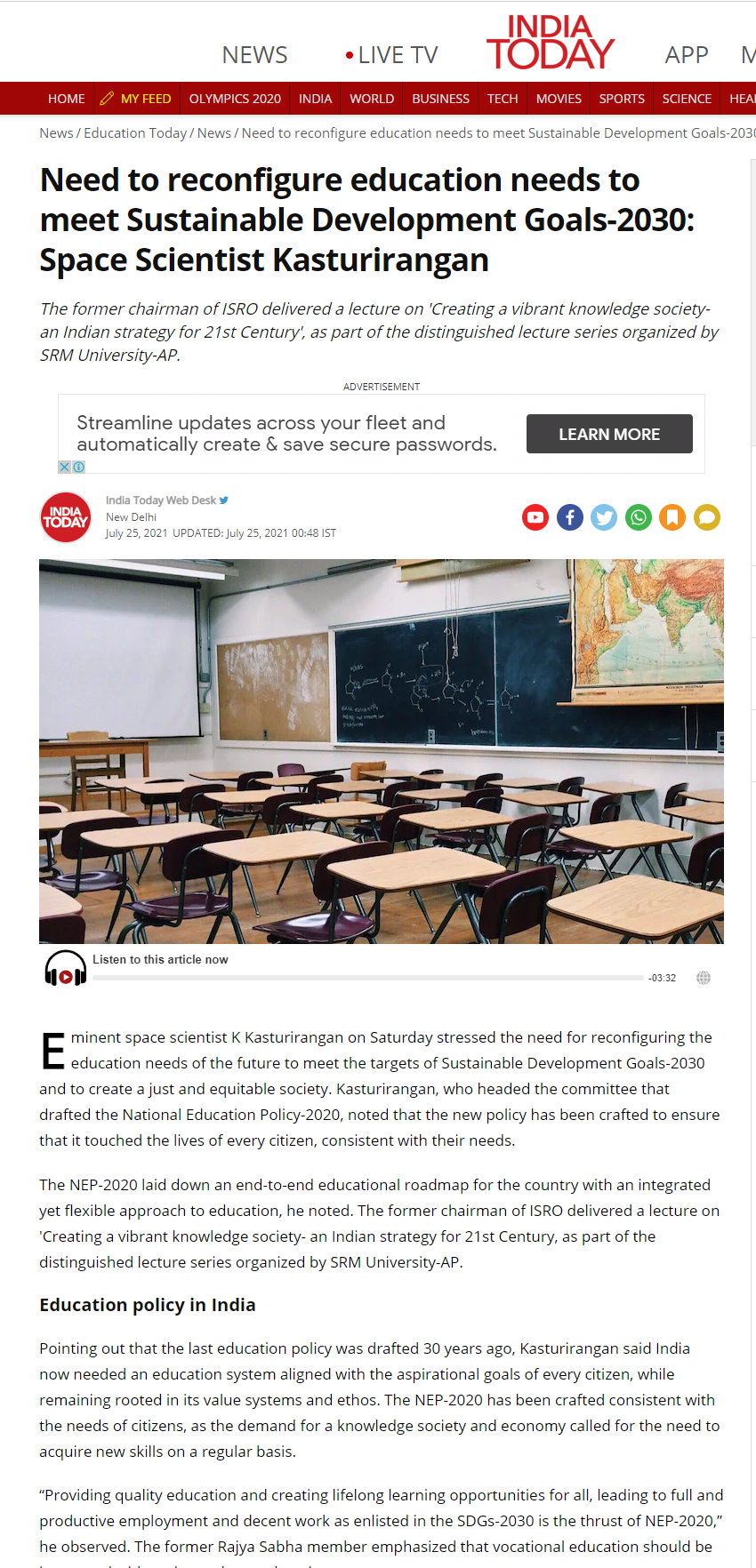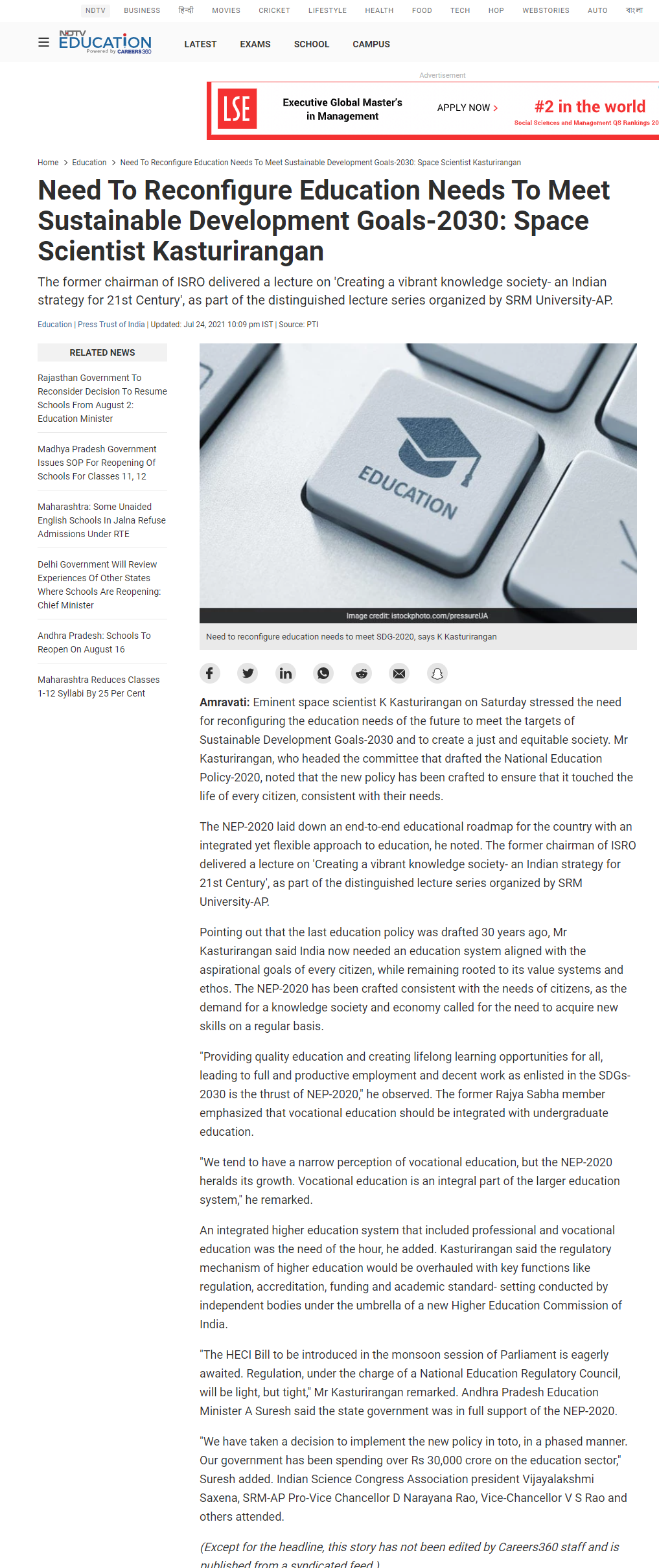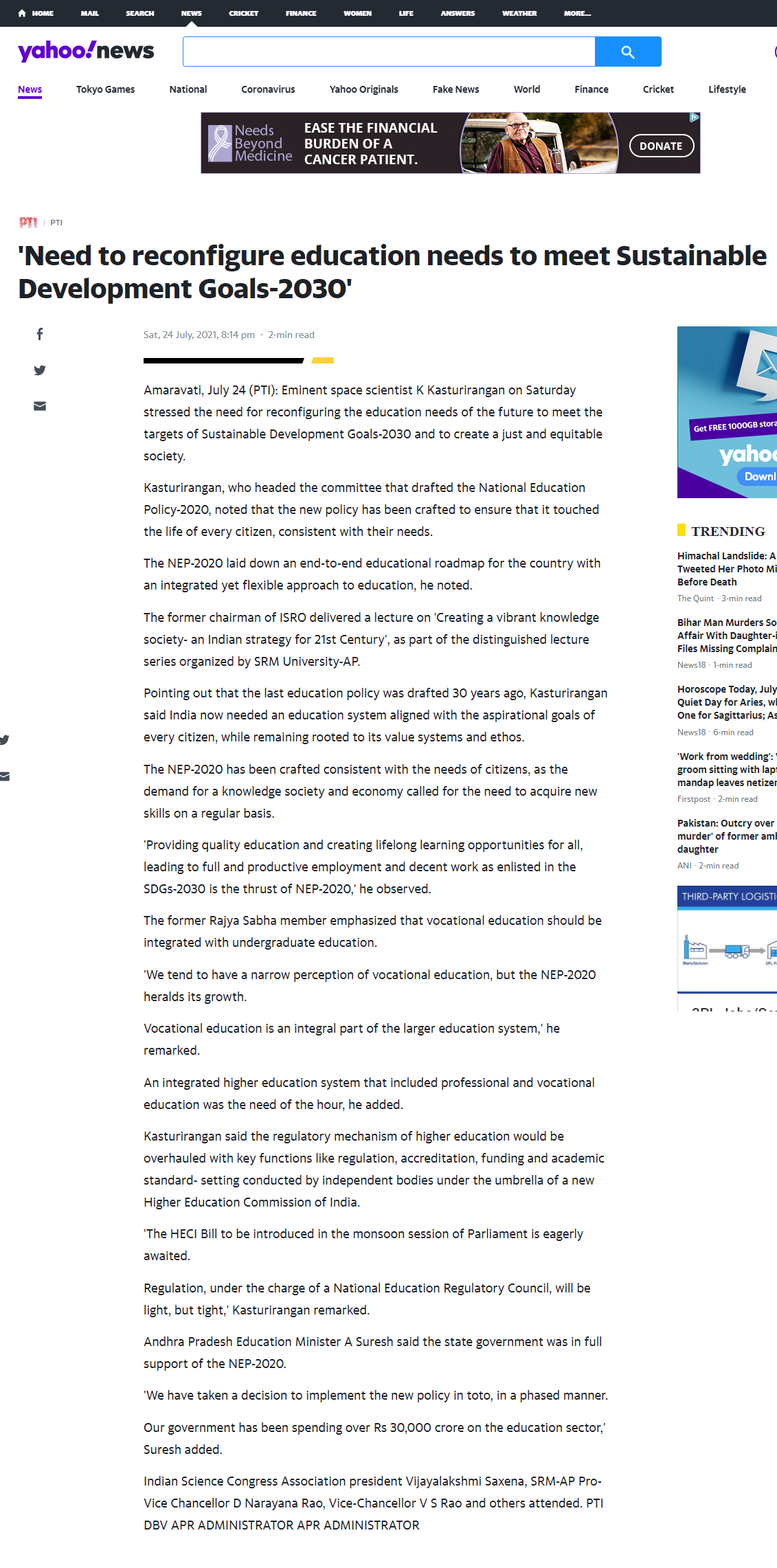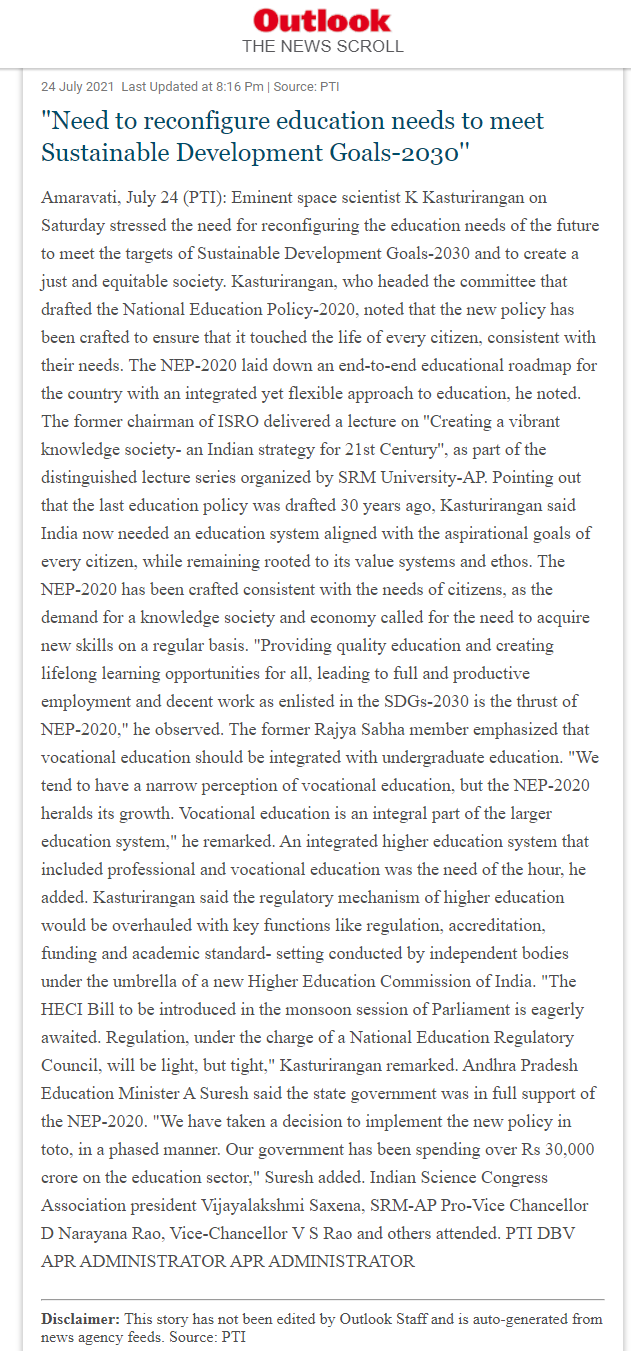Journey of an ECE graduate to ML engineering
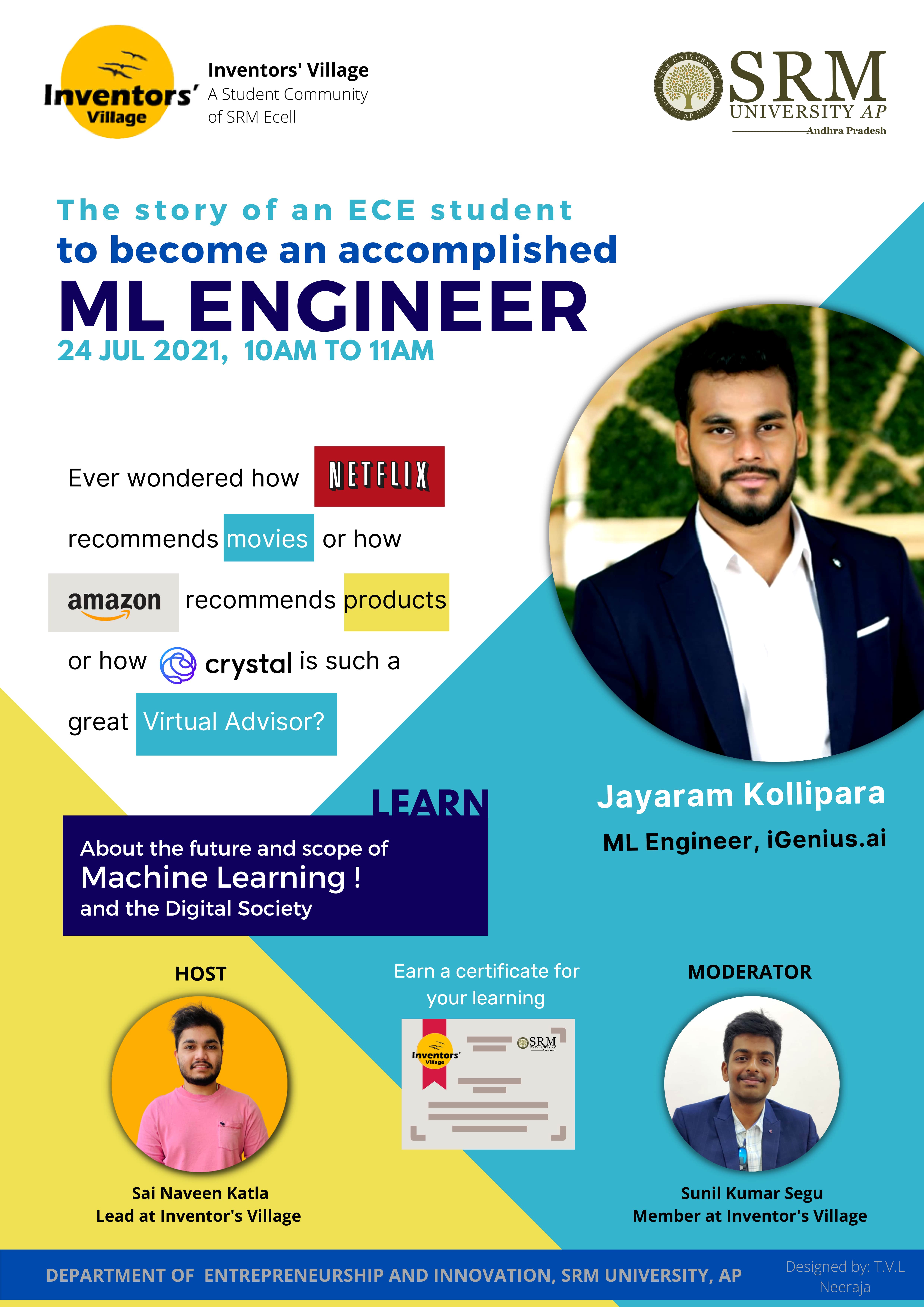 Ever wondered how Netflix recommends movies or how Amazon recommends products or how Crystal is such a big virtual advisor? The Department of Entrepreneurship and Innovation at SRM University-AP organises a guest lecture by Mr Jayaram Kollipara, Head of Recommendation Systems in http://igenius.ai/ on July 24, 2021, at 10.00 am. SRM E-Cell aims to foster an entrepreneurial spirit and incubate the ideas into startups through its events, programmes, and initiatives.
Ever wondered how Netflix recommends movies or how Amazon recommends products or how Crystal is such a big virtual advisor? The Department of Entrepreneurship and Innovation at SRM University-AP organises a guest lecture by Mr Jayaram Kollipara, Head of Recommendation Systems in http://igenius.ai/ on July 24, 2021, at 10.00 am. SRM E-Cell aims to foster an entrepreneurial spirit and incubate the ideas into startups through its events, programmes, and initiatives.
Technology makes life easier for us in many ways. Machine Learning and Recommendations Systems have become the backbone of the entertainment industry varying from video streaming apps to social media platforms. Inventor’s Village, a student community of SRM E-cell has taken this initiative to reimagine data interaction. Mr Sai Navven Katla, Lead at Inventor’s Village will be the host and Mr Segu Sunil Kumar will be the moderator of the event.
About the Speaker:
Mr Jayaram Kollipara has wide industry experience in Networking, AI, and ML. He is currently working as a Machine Learning Engineer in IGenius.AI and he is also one of the founding members of that startup. Currently, Igenius.ai is one of the Top-5 Startups in Italy. As a young innovator, his life inspires engineering students in universities for creative experiments.
SRM E-Cell cordially invites you to this event on July 24, 2021, at 10.00 am wherein you can learn more about the future and scope of Machine Learning from the industry expert.
- Published in Events, IDEA Events
Queueing theoretic models for wireless multicast systems and power control
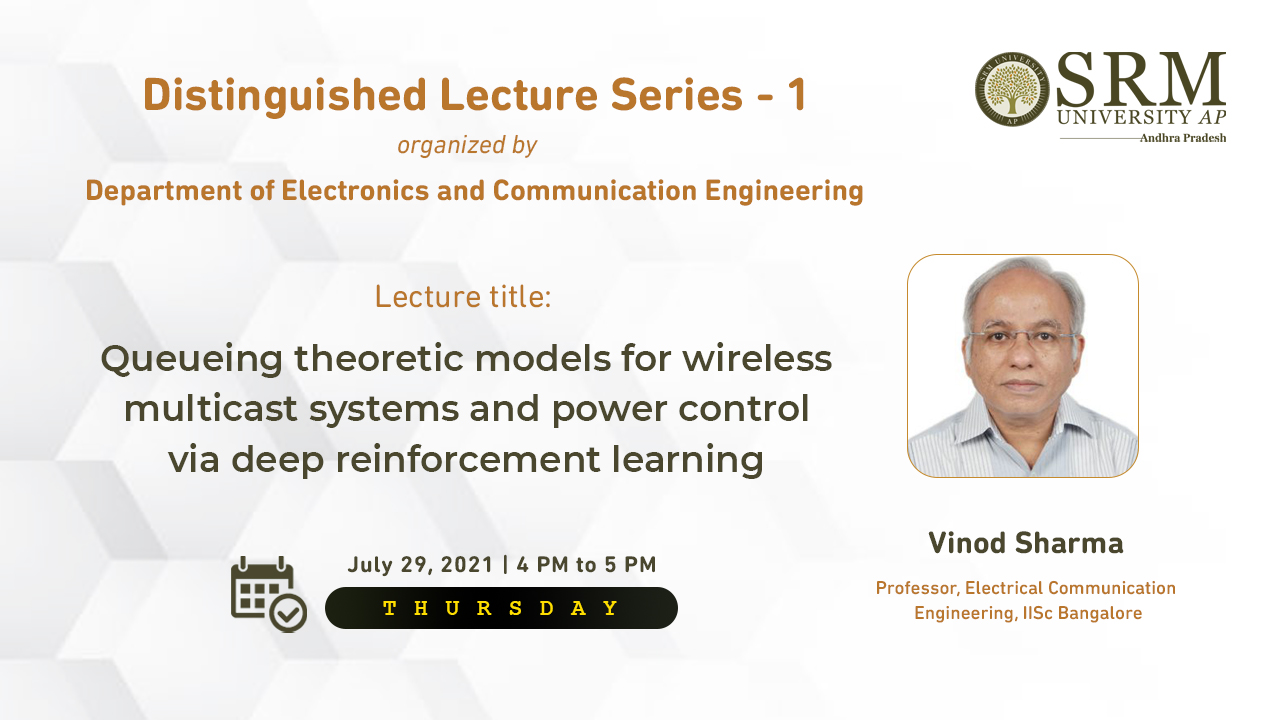 As a part of the departmental Distinguished Lecture Series, the Department of Electronics and Communication Engineering at SRM University-AP is organising the first lecture on the topic “Queueing theoretic models for wireless multicast systems and power control via deep reinforcement learning”. Dr Vinod Sharma, Professor in Electrical Communication Engineering, IISc, Bangalore will be the keynote speaker of the session which will be held on July 29, 2021, at 4.00 pm.
As a part of the departmental Distinguished Lecture Series, the Department of Electronics and Communication Engineering at SRM University-AP is organising the first lecture on the topic “Queueing theoretic models for wireless multicast systems and power control via deep reinforcement learning”. Dr Vinod Sharma, Professor in Electrical Communication Engineering, IISc, Bangalore will be the keynote speaker of the session which will be held on July 29, 2021, at 4.00 pm.
Abstract:
We consider a wireless Base station (BS) transmitting on a downlink to multiple users. The BS has a finite number of files that the users can request. The users may have their own local caches. If a user requests a file and it is not in its cache, the request goes to the BS. This model is the practical scenario of downloading/streaming videos from Netflix. In order to reduce the transmission load on the downlink, we exploit the fact that the downlink is a broadcast channel and multiple users may be requesting the same file. This is accomplished by designing a novel multicast scheme in which all requests at the BS for the same file are merged together and are satisfied by a single transmission from the BS. This simple and natural scheme is shown to provide lower mean sojourn time compared to the currently popular coded caching schemes in literature and is much simpler to implement. We have also theoretically studied this queue and obtained approximate mean sojourn times. Next, we have shown that considering the channel fading can actually wipe out most of the benefits of our multicast scheme. However, we suggest a simple modification to the scheme which restores most of the gains. Furthermore, we show that adaptively changing the transmit power at the BS based on the instantaneous channel gains of the users can further significantly reduce the mean sojourn times. To get optimal power control, we use DQN, a Deep Reinforcement Learning algorithm. It is modified to ensure that the long term power constraint is satisfied and that it tracks the time-varying channel and request statistics.
About the Speaker:
Vinod Sharma completed his B.Tech Electrical Engineering from IIT Delhi, in 1978, PhD in Electrical and Computer Engineering, from Carnegie Mellon University, in 1984. He is Professor in Electrical Communication Engg., IISc, since March 2000. Prior to it, he was Associate Professor in Electrical Engineering, IISc Bangalore. He was Chairman of the Department of Electrical Communication Engineering from July 2007 to November 2011. He was Assistant Professor, Electrical and Communication Engg, Northeastern University; and Visiting Faculty, Electrical Engineering, University of California, Los Angeles. Dr Vinod’s research interests are in the area of Communication and Computer Networks, Wireless Communication, Sensor Networks, Queueing Theory, Information Theory and Statistical Estimation Theory.
Join this free informative webinar on July 29, 2021, from 4.00 pm onwards to gain research insights from the field expert.
Register here:https://srmap.zoom.us/webinar/register/WN_npqiEhMbSZebRzIj_VmRrA
- Published in Departmental Events, ECE Events, Events
Assessing the benefits of irrigation against heat stress in agriculture
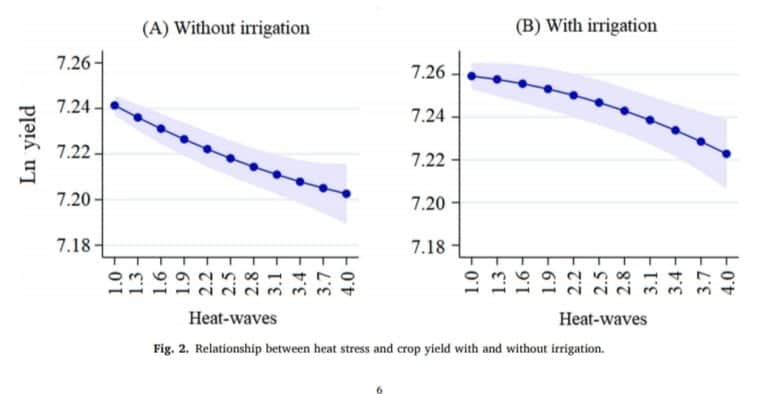 Heat stress negatively affects crop yield and its impact has increased over time. Researchers in India study this situation with utmost priority. Consequently, Dr Ghanshyam Kumar Pandey, Assistant Professor in the Department of Economics at SRM University-AP has co-authored a paper with Pratap S Birthal and et. al titled “Benefits of irrigation against heat stress in agriculture: Evidence from wheat crop in India” in the journal Agricultural Water Management, Vol 255, having an Impact factor 4.02.
Heat stress negatively affects crop yield and its impact has increased over time. Researchers in India study this situation with utmost priority. Consequently, Dr Ghanshyam Kumar Pandey, Assistant Professor in the Department of Economics at SRM University-AP has co-authored a paper with Pratap S Birthal and et. al titled “Benefits of irrigation against heat stress in agriculture: Evidence from wheat crop in India” in the journal Agricultural Water Management, Vol 255, having an Impact factor 4.02.
Applying the fixed effects regression technique to the highly spatially disaggregated district-level data from 1966–67 to 2011–12. This paper has assessed the impact of heat stress on wheat production in India and concurrently evaluated the role of irrigation in offsetting its harmful impact. The study has brought out three key highlights:
(i) Heat stress negatively impacts crop yield, and the impact has increased over time.
(ii) Irrigation, besides its contribution towards improving crop yield, also moderates the harmful impact of heat stress, but over time its effectiveness has declined.
(iii) The measure of heat stress built on multiple aspects of excess temperature (i.e., intensity, persistence, and frequency) explains variation in crop yield better than working on a single aspect of it.
Given the increasing scarcity of irrigation water and rising temperature, these findings suggest the need for exploring technological and policy options for improving irrigation water use, efficiency, and breeding of crops for heat tolerance and low water footprints.
This research paper is written in collaboration with ICAR-National Institute of Agricultural Economics and Policy Research, PUSA, New Delhi. Dr Ghanshyam’s future projects are focused on climate change and agriculture, and the effect of climate change on the livestock sector in India.
Read the full paper here: https://doi.org/10.1016/j.agwat.2021.106950
- Published in Departmental News, Economics Current Happenings, Economics News, News, Research News
UDL 11 – Dr Kasturirangan
The Hindu, Vijayawada – July 25
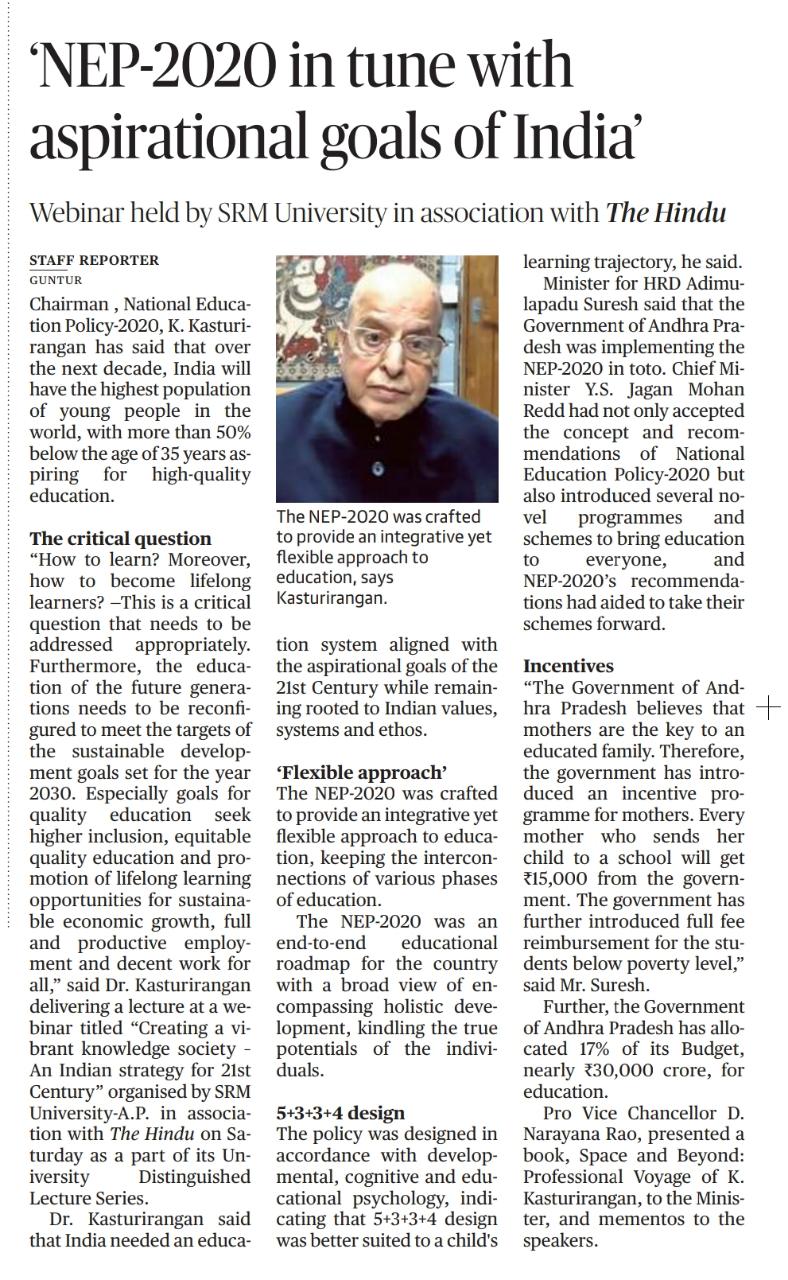
The Hindu, Visakapatinam – July 25
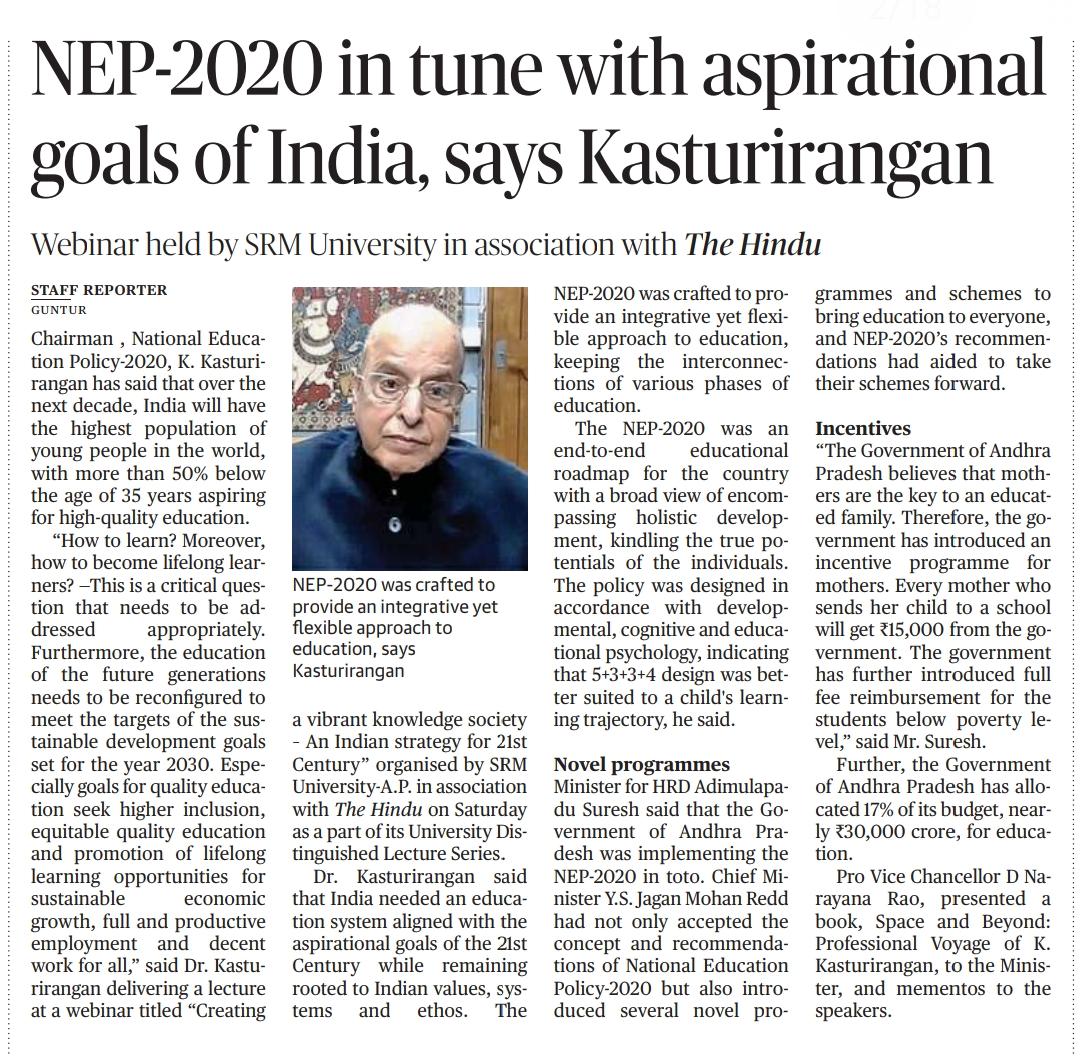
Times of India – July 25
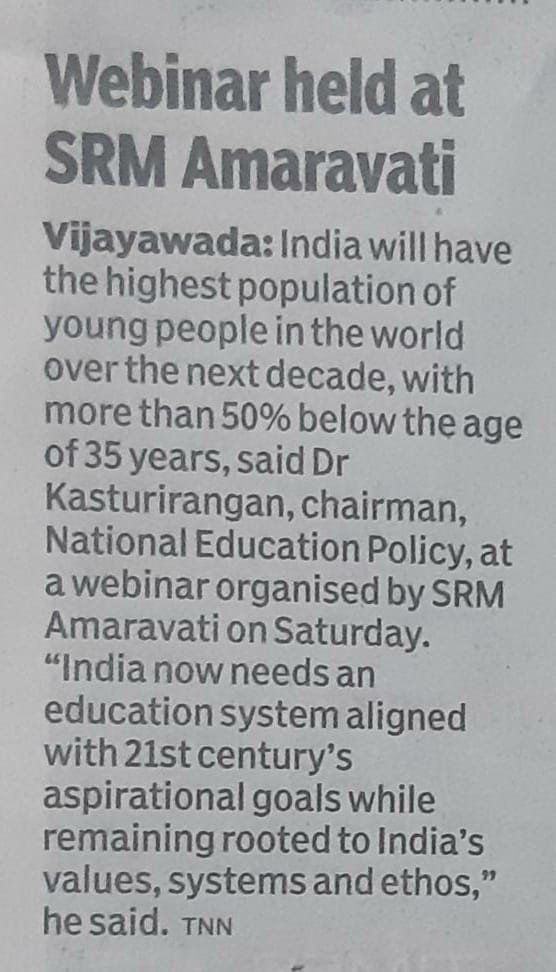
New Indian Express – July 25
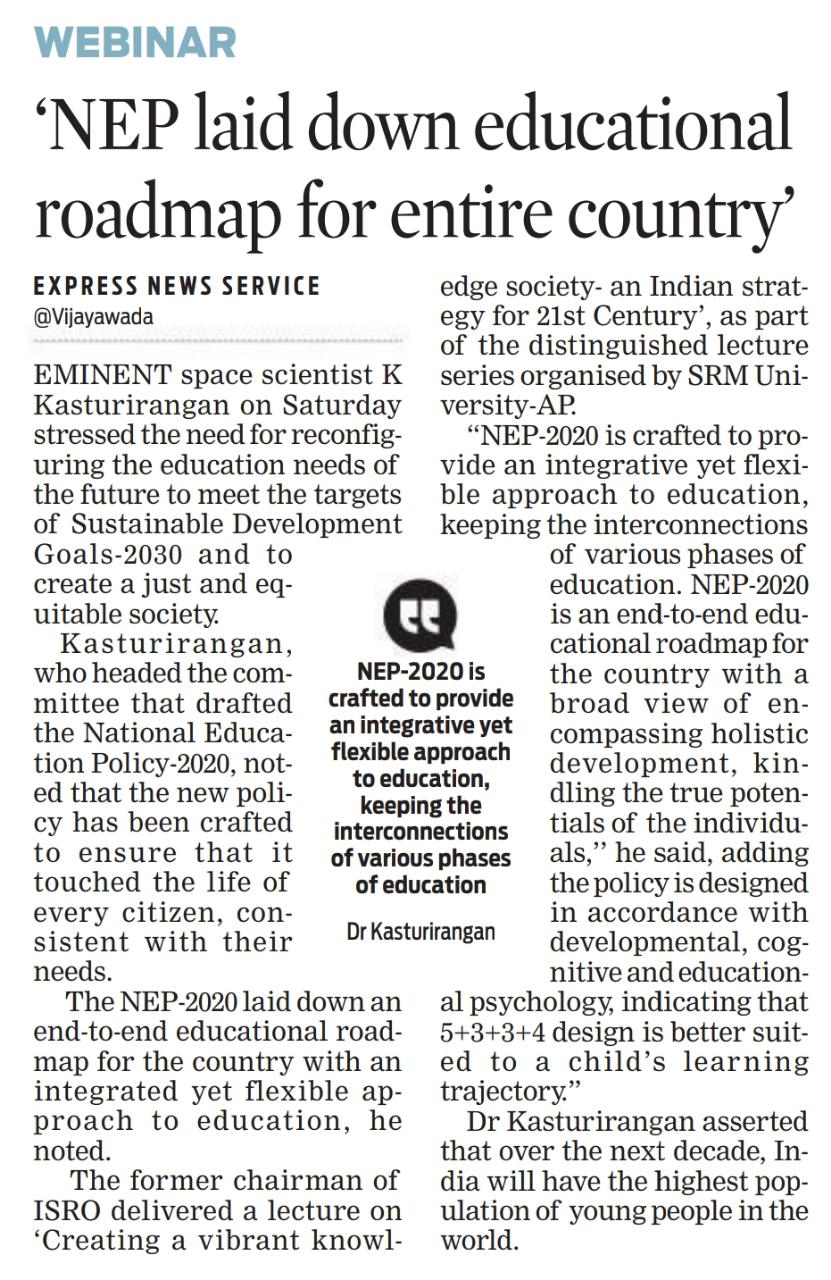
Daily Pioneer – July 25
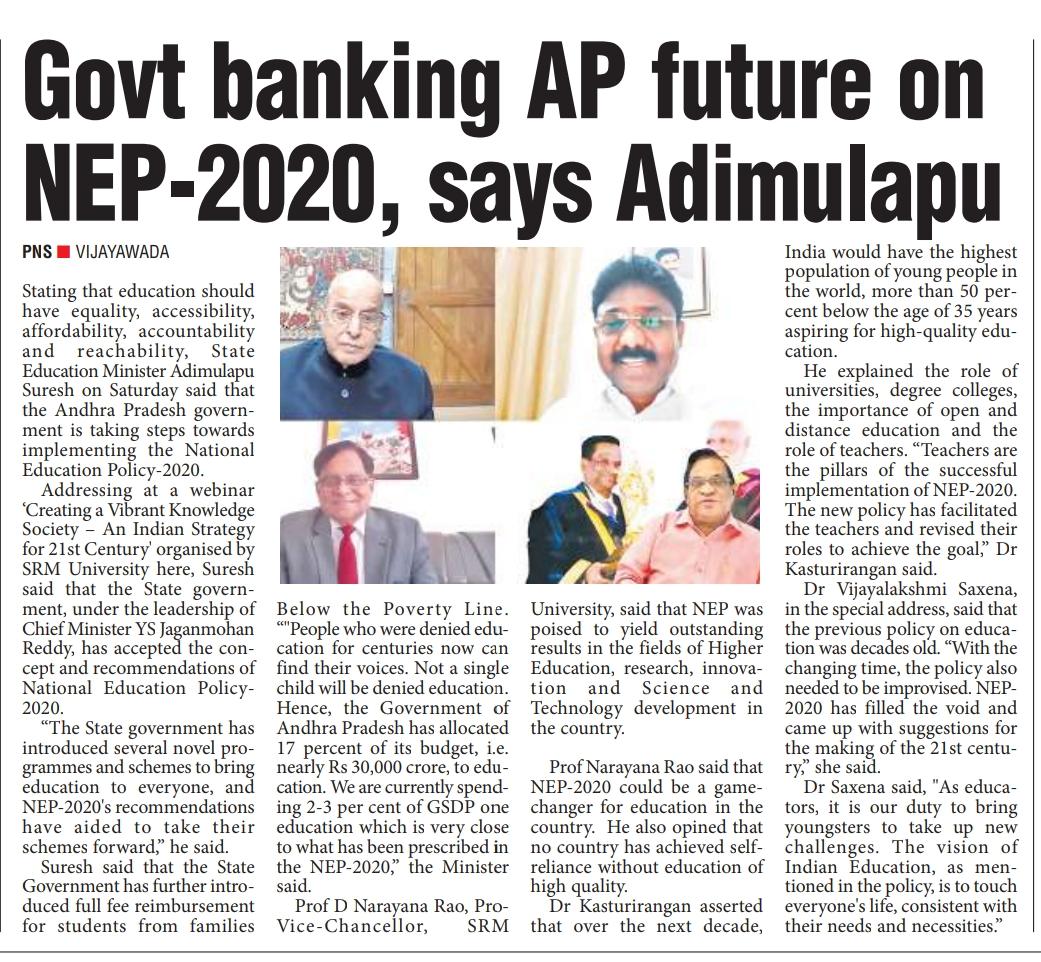


The Hindu, Vijayawada – July 23
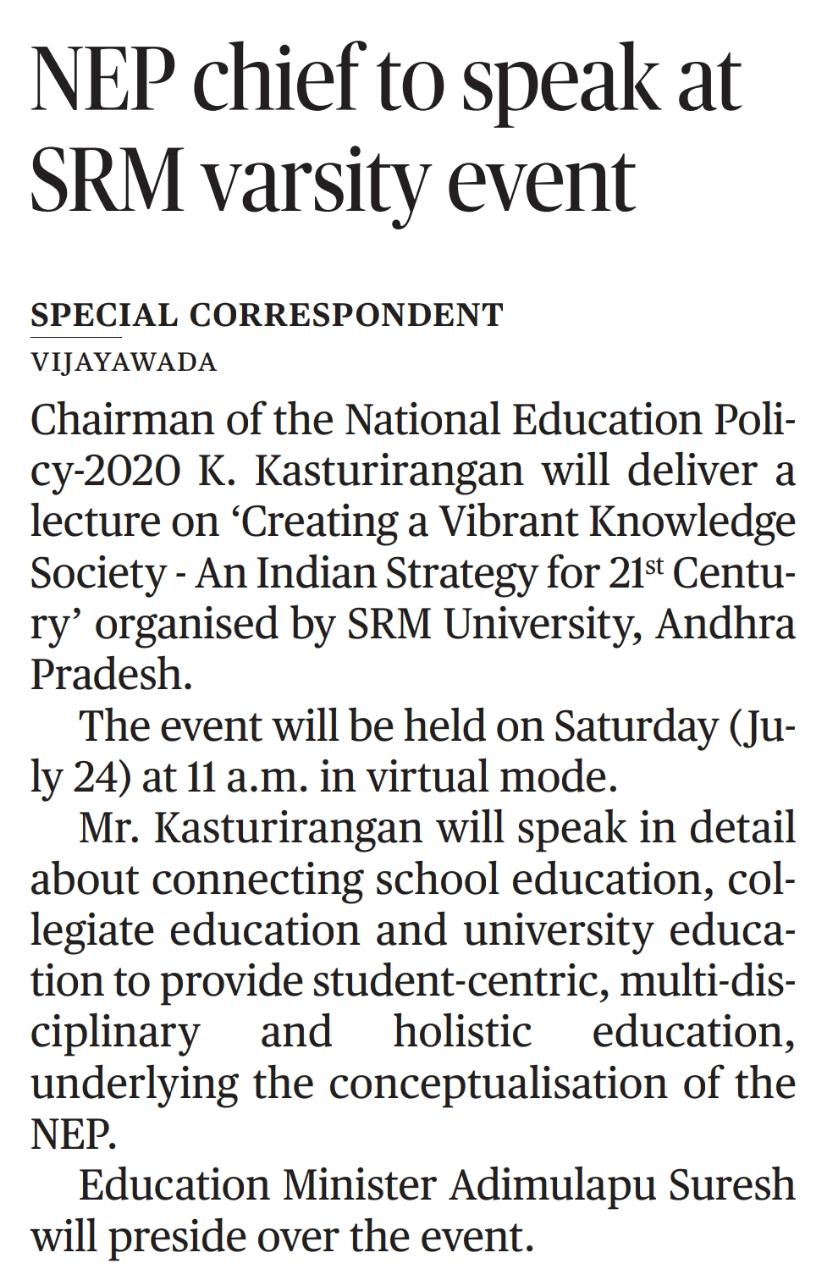
The Hindu, Hyderabad – July 23
Deccan Chronicle, Vijayawada – July 25

Financial Express, Hyderabad – July 25
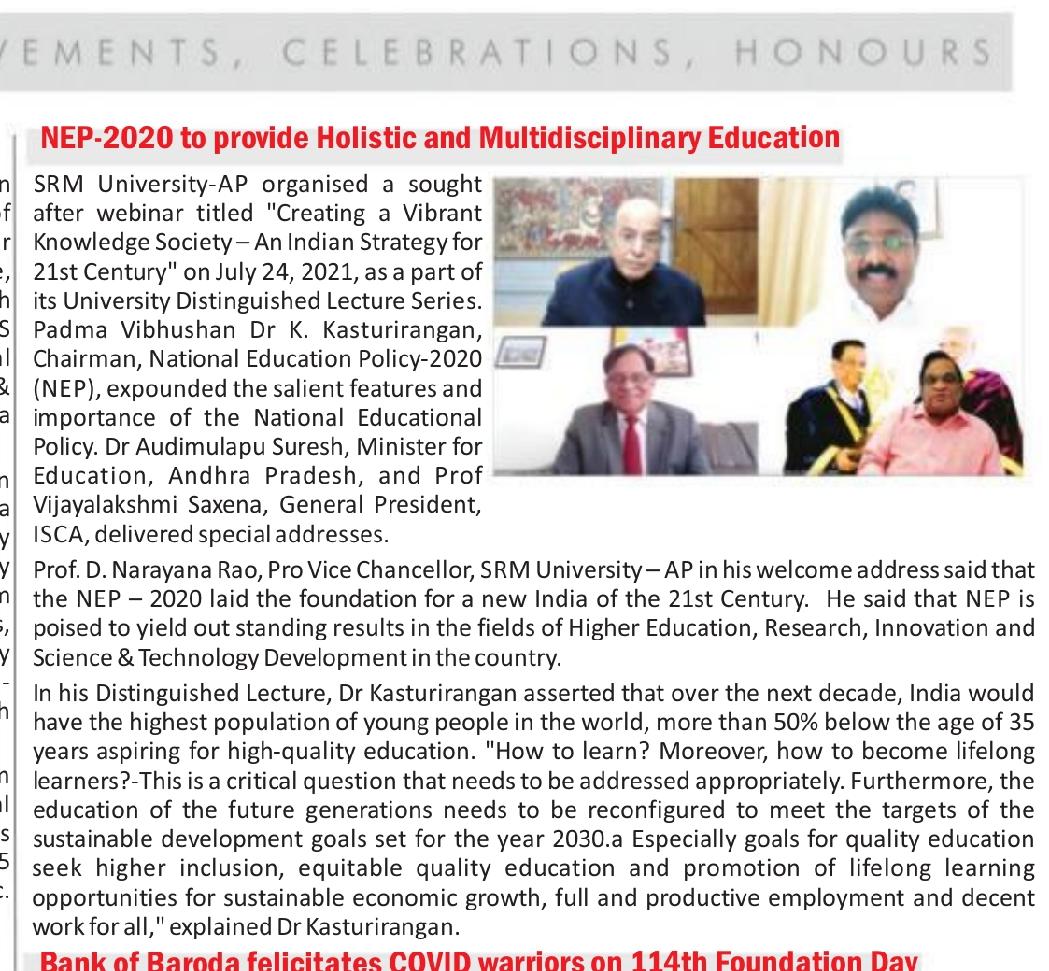
Eenadu – July 25
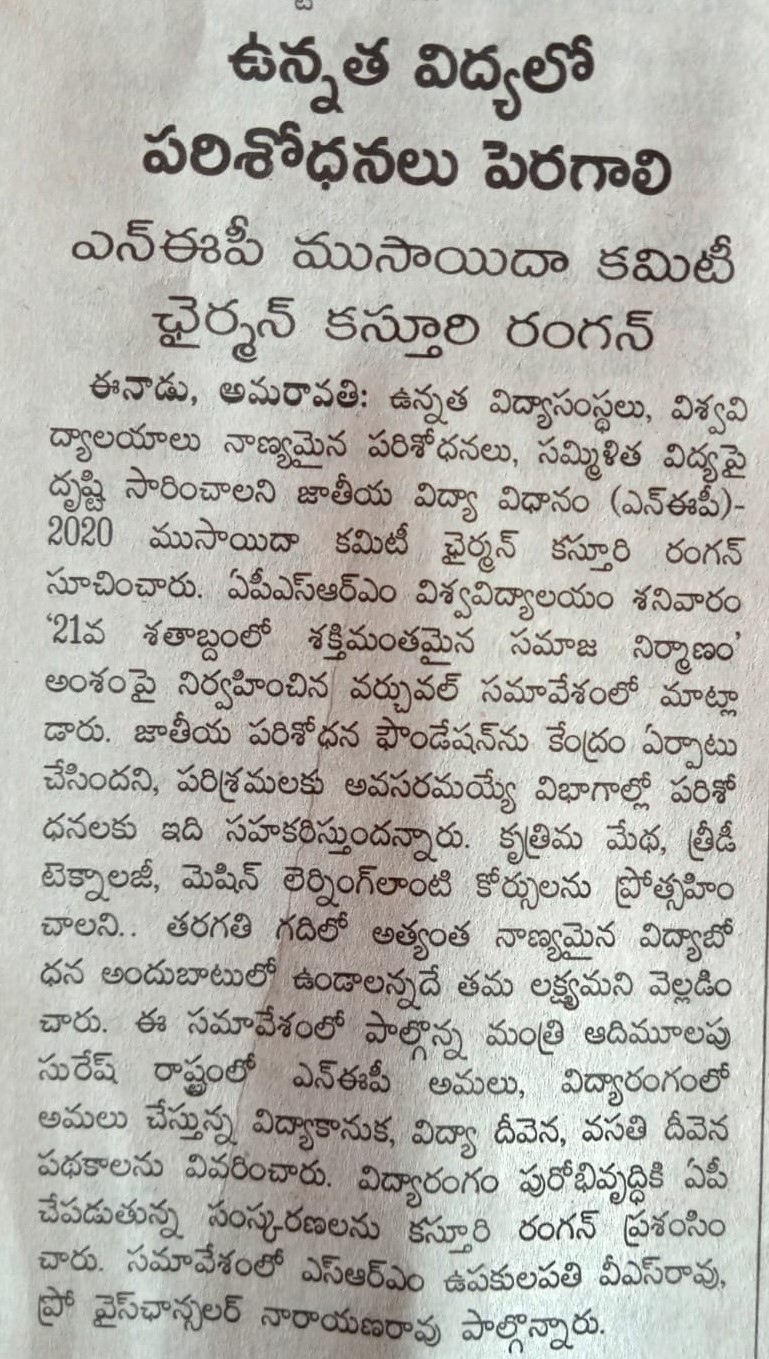
Sakshi – July 25
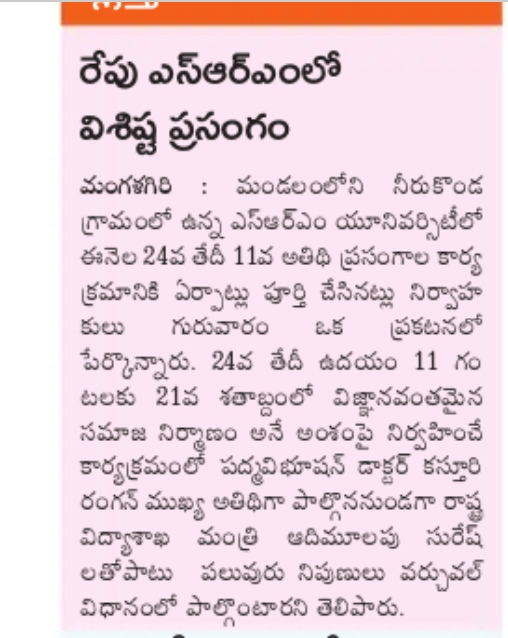
Andhra Prabha – July 25
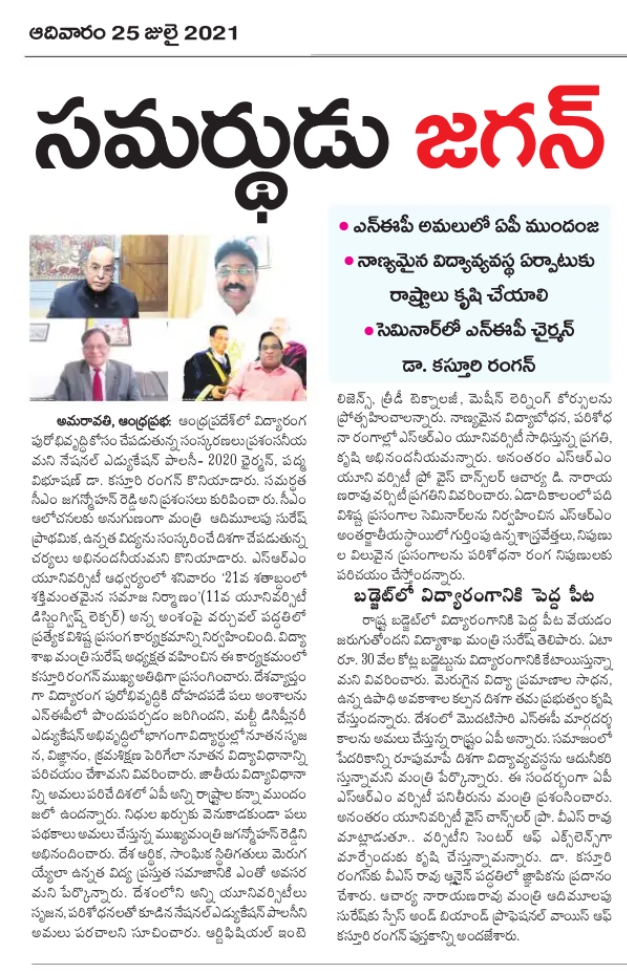
Andhra Jyothi – July 25
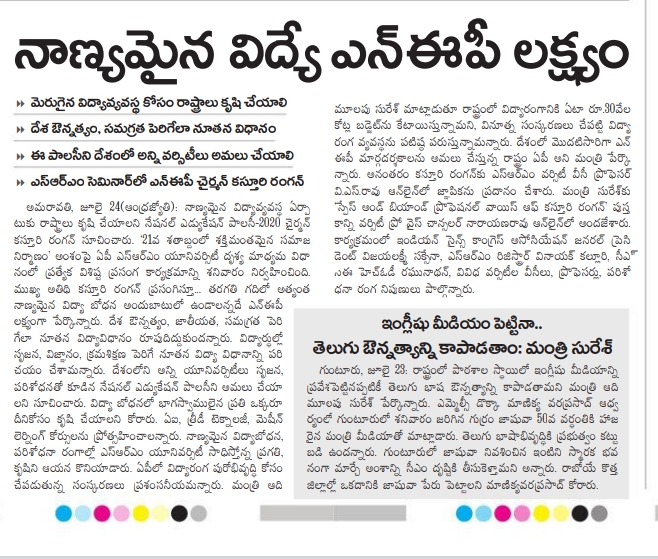
Manam – July 25
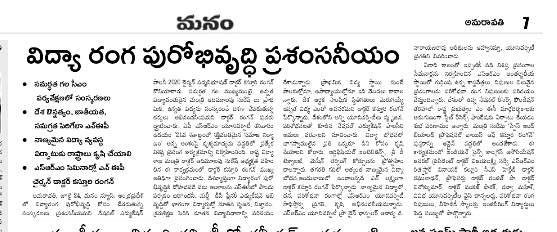
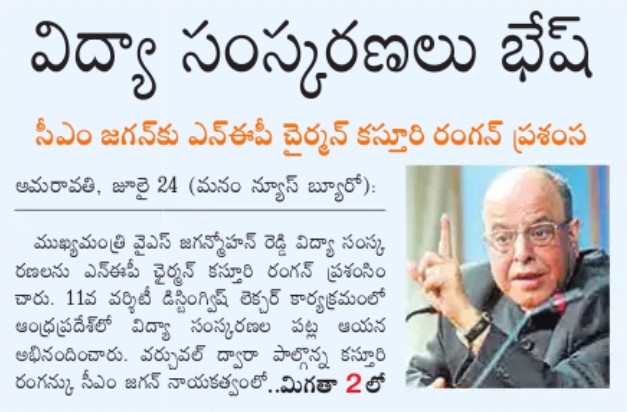
Prajasakthi – July 25
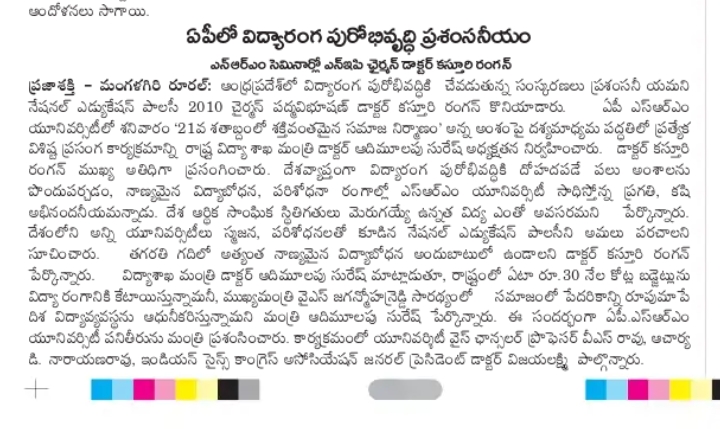
Surya – July 25
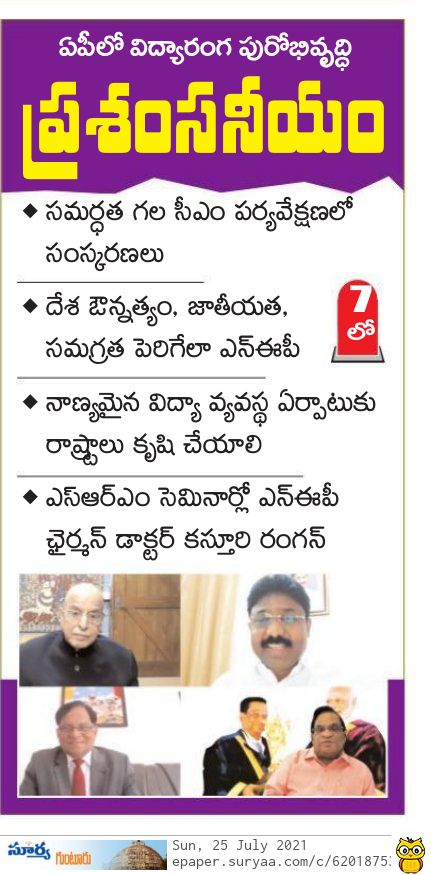
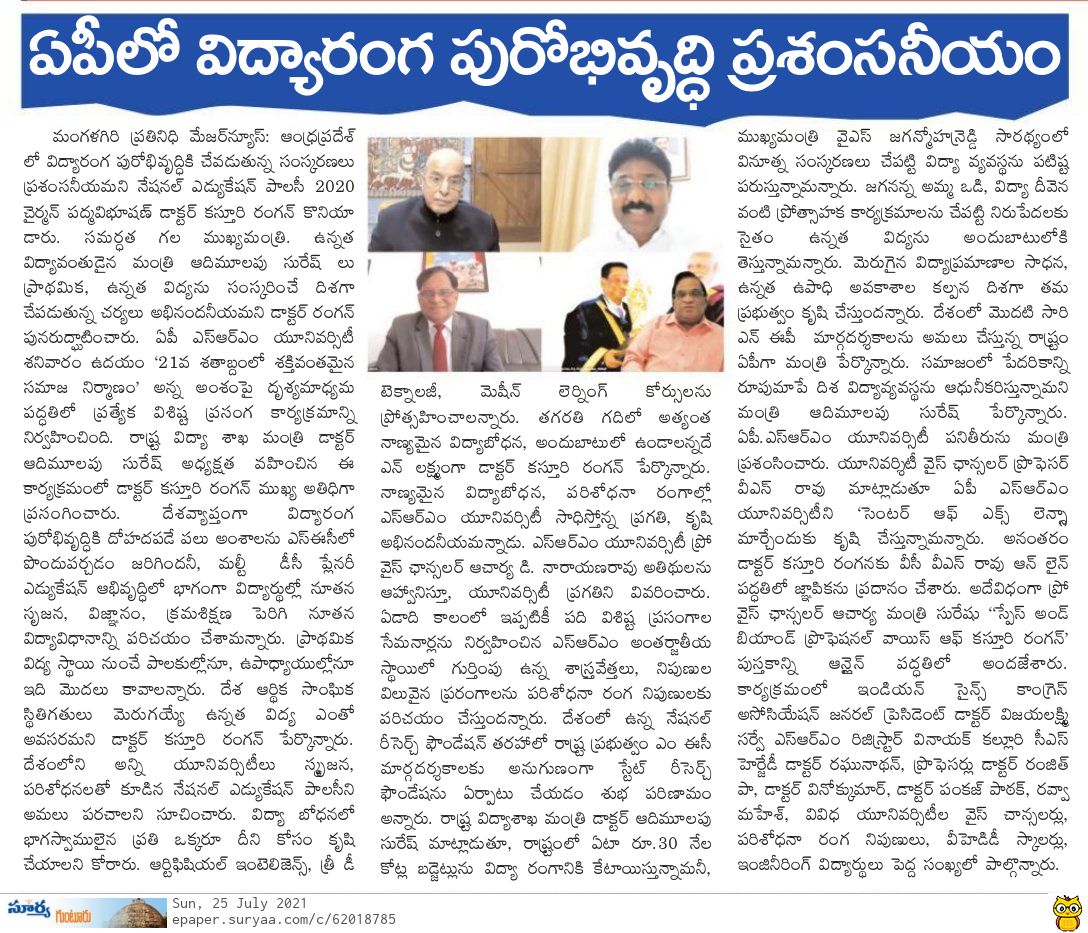
Vaartha – July 25
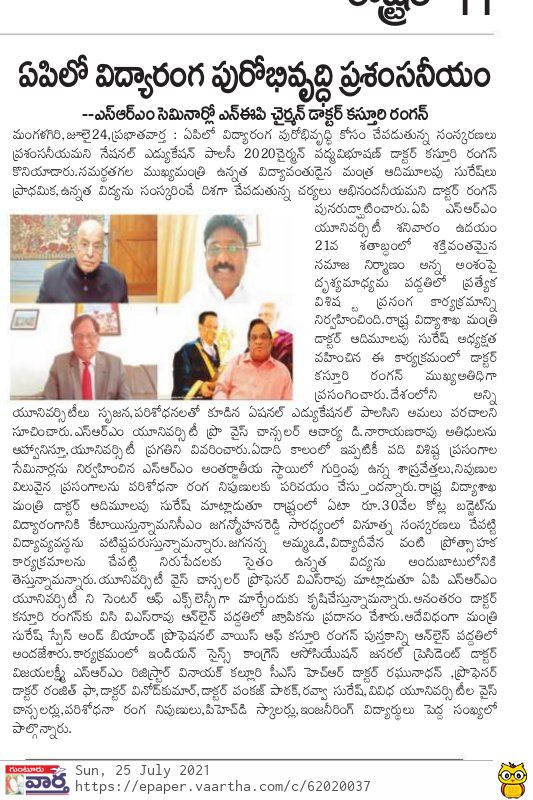
Vartha Prapancham – July 25
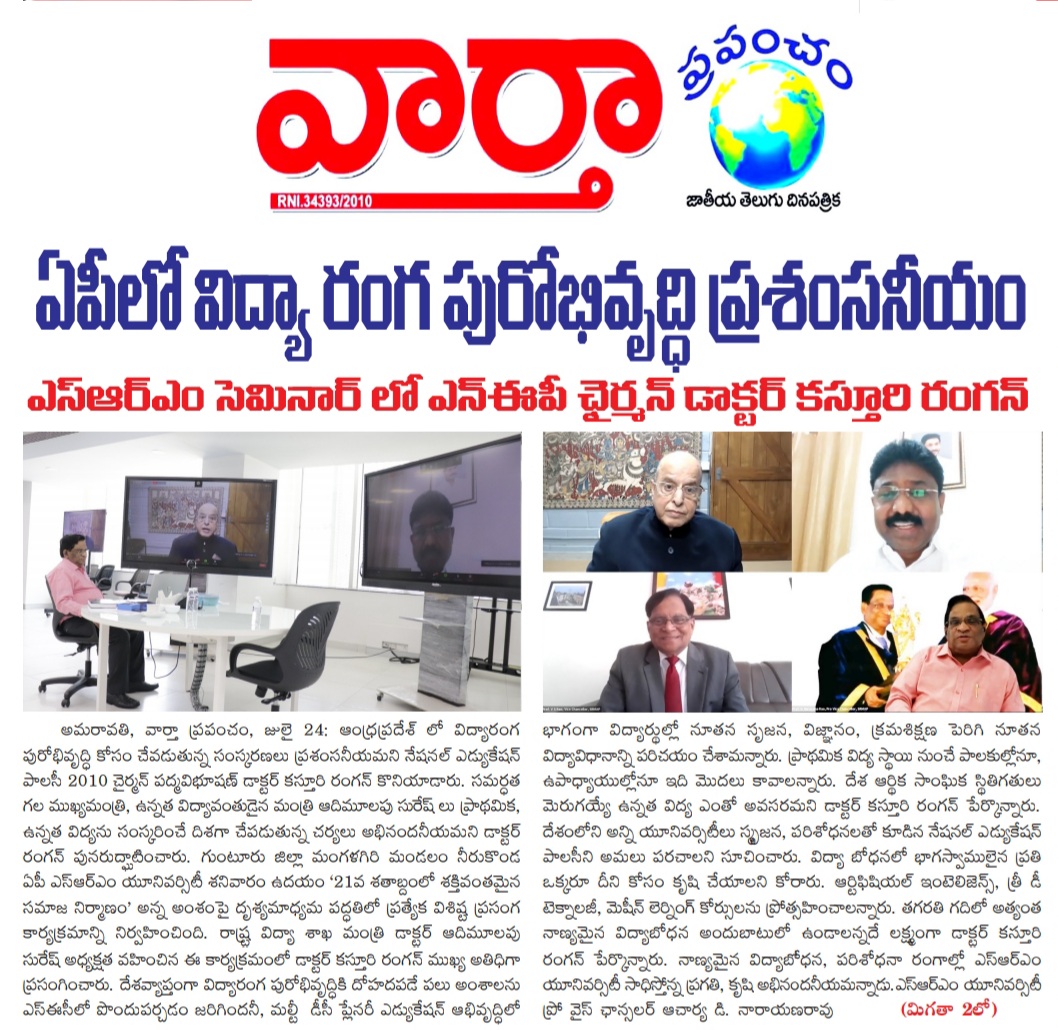
Visalaandhra – July 25
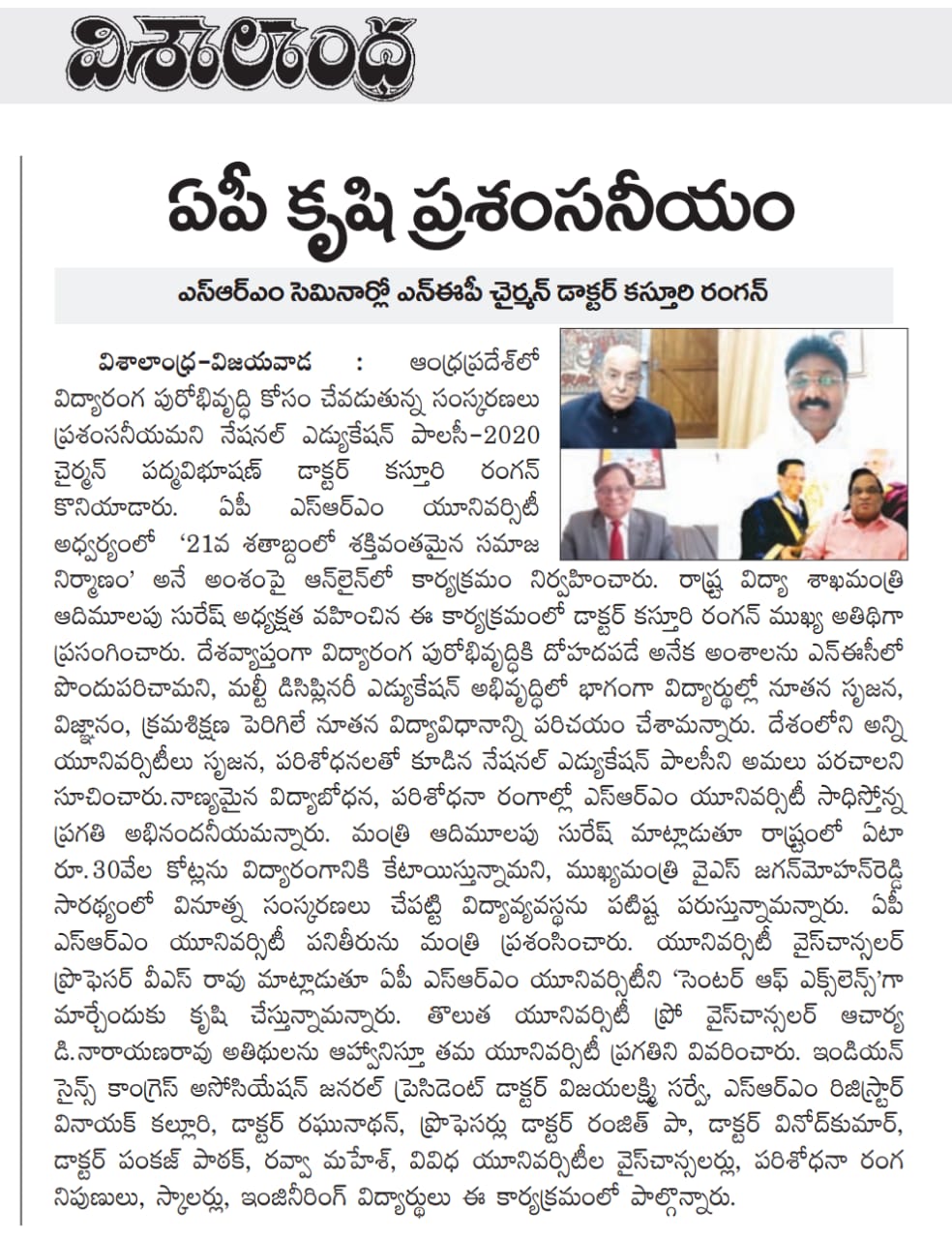
Dainik Bhaskar – July 25
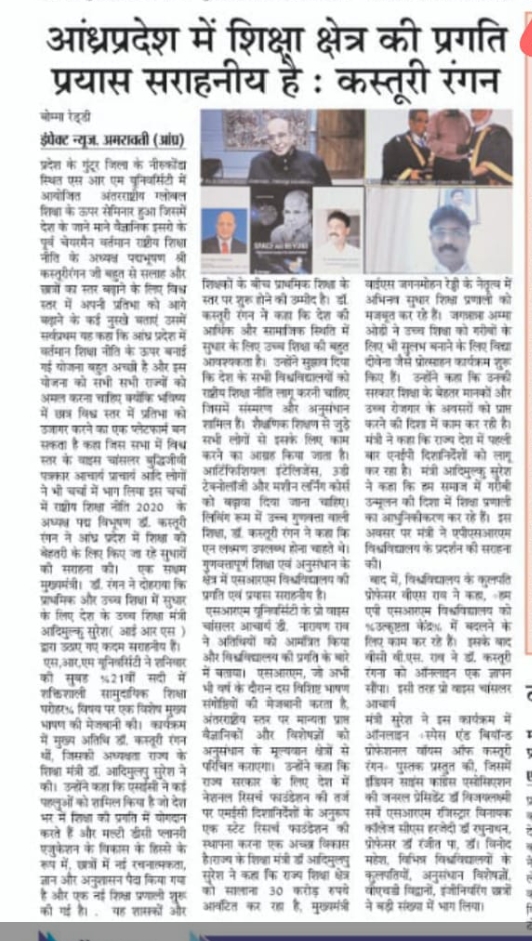
Dainik Arth Prakash – July 25
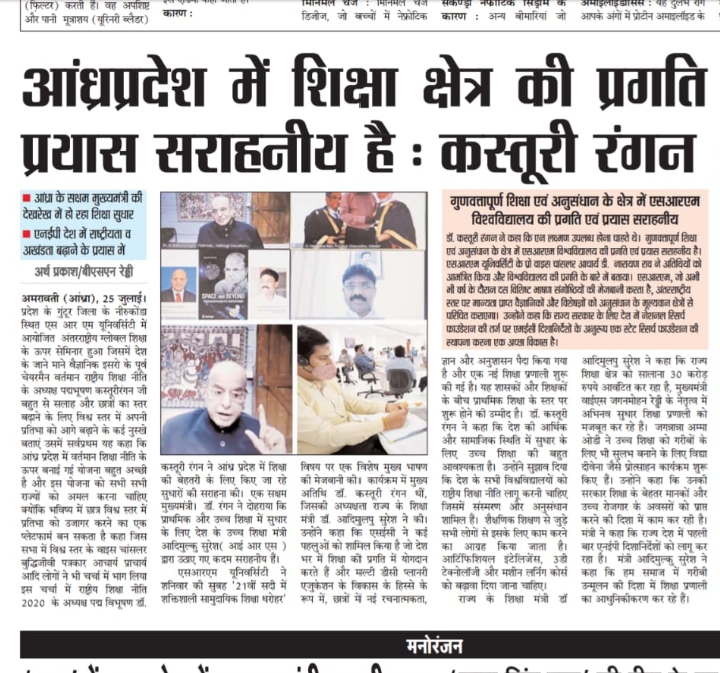
Andhra Prabha – July 23
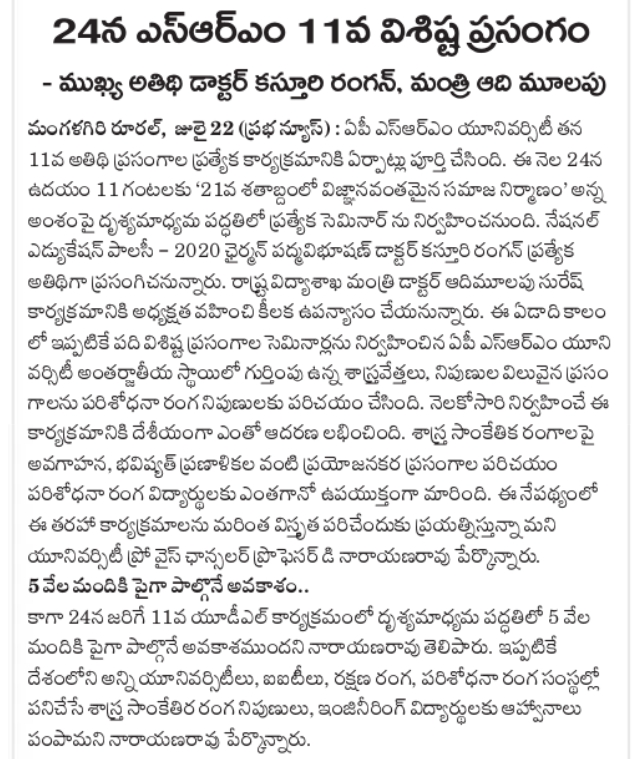
Sakshi – July 23
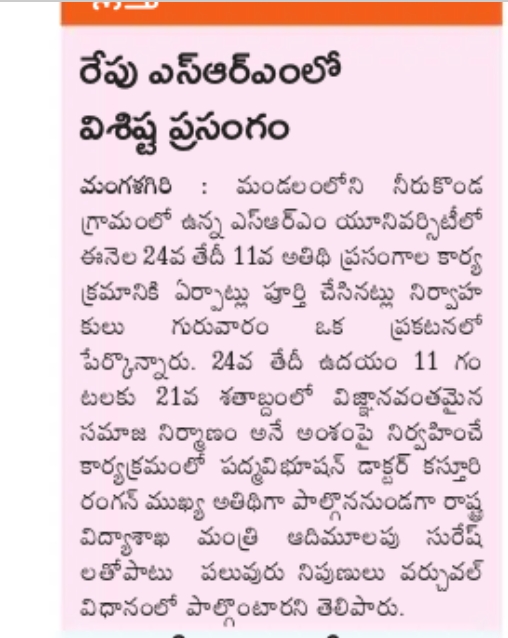
Surya – July 23
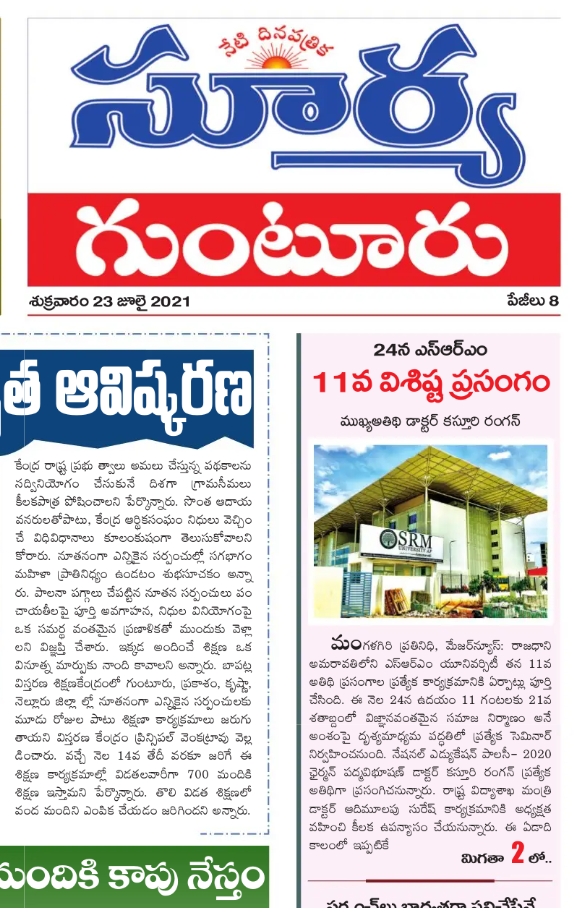
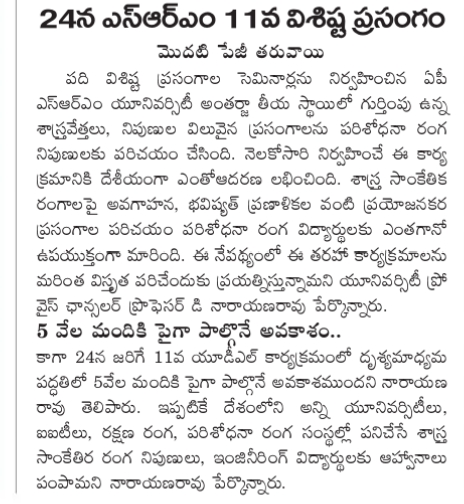
Vartha Prapancham – July 23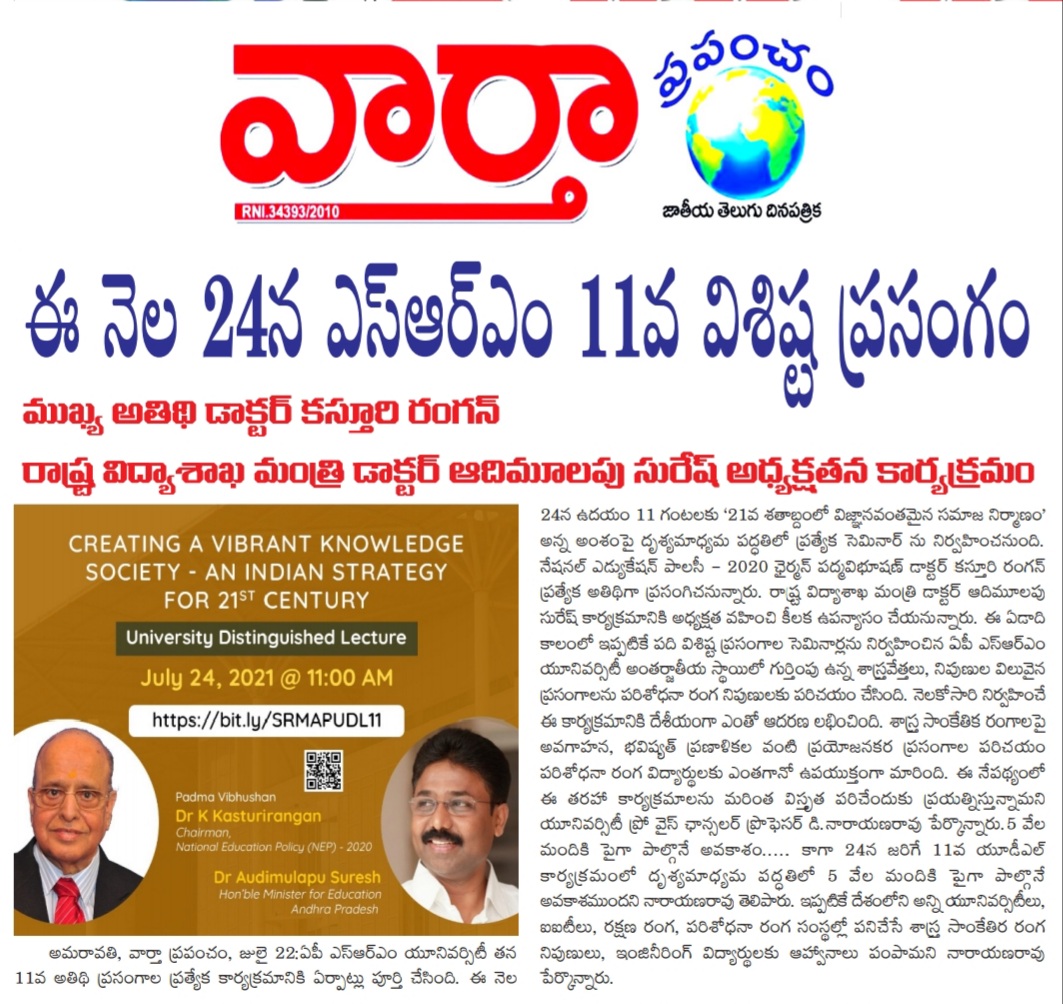
Vaartha – July 23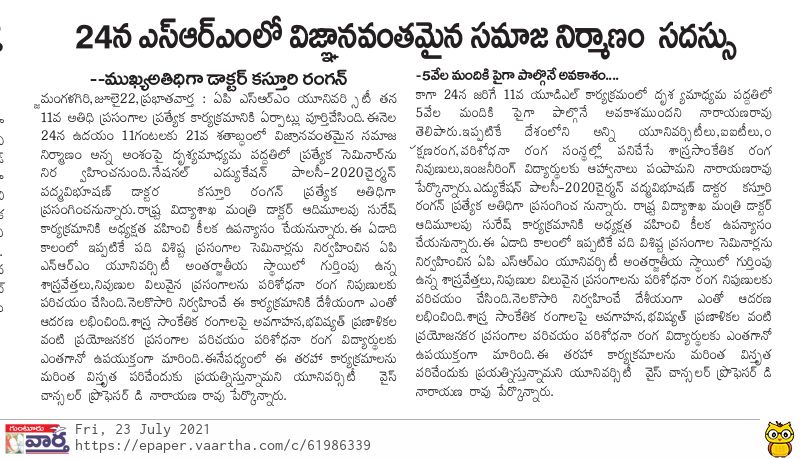
- Published in Newsroom
Insights into embedded systems @ ECE Department
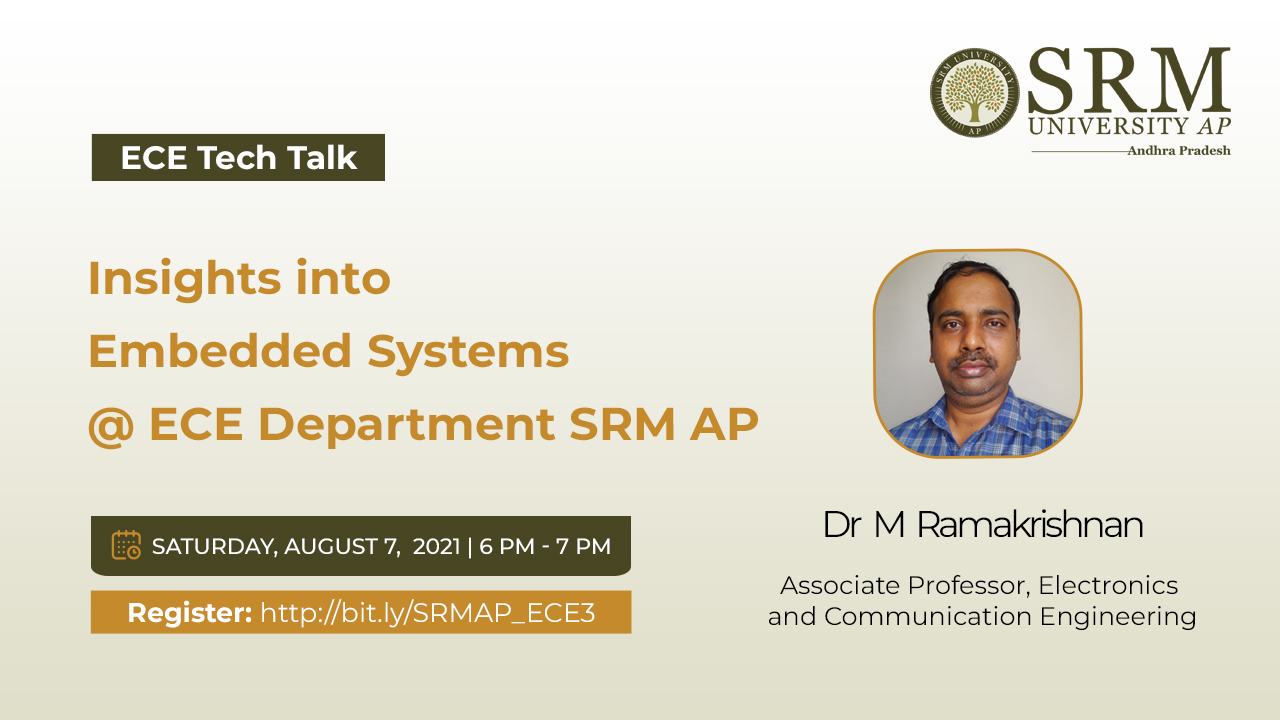 The Department of Electronics and Communications Engineering (ECE) at SRM University-AP is conducting a webinar on the topic “Insights into embedded systems @ ECE Department SRM AP” on August 07, 2021, at 6.00 pm. Dr M Ramakrishnan, Assistant Professor in the Department of ECE will deliver a captivating lecture and enlighten the virtual gathering on the topic. (more…)
The Department of Electronics and Communications Engineering (ECE) at SRM University-AP is conducting a webinar on the topic “Insights into embedded systems @ ECE Department SRM AP” on August 07, 2021, at 6.00 pm. Dr M Ramakrishnan, Assistant Professor in the Department of ECE will deliver a captivating lecture and enlighten the virtual gathering on the topic. (more…)
- Published in Admission Events - Domestic, Departmental Events, ECE Events, Events
CSE students complete Semester Abroad Programme at UC Davis
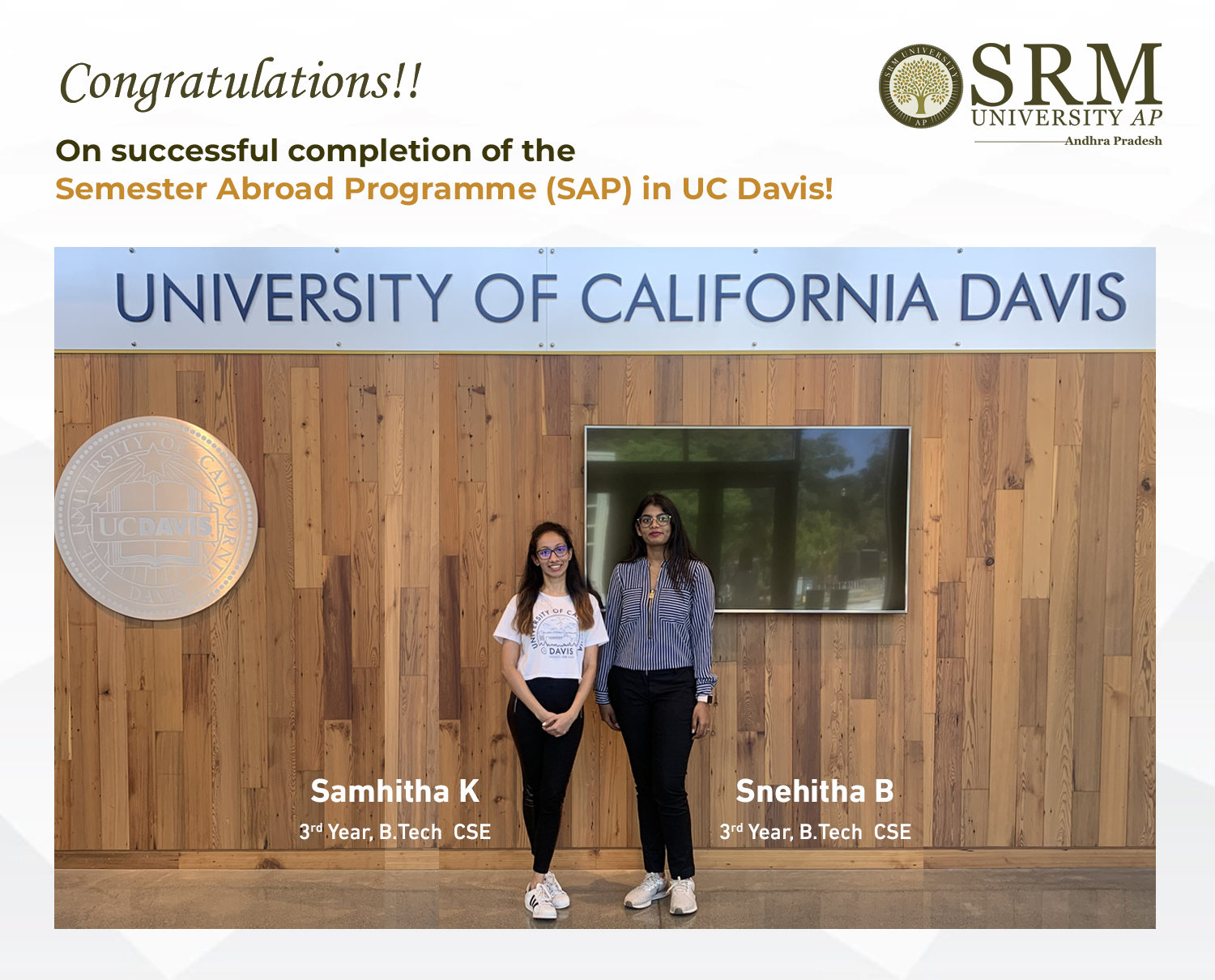 Barukula Snehitha Naga Sai and Kamma Samhitha are two brilliant third-year Computer Science Engineering students selected for the enviable Semester Abroad Programme (SAP) at the University of California, Davis. The students received a partial scholarship from SRM University-AP to complete their final semester abroad with the global study programme at UC Davis. The selection process for the semester abroad programme generally starts at the end of the 3rd and 5th semesters when our university carries out student interviews. A minimum of 8.7 CGPA is required to be eligible for the SAP scholarship and the programme focuses on building engineering design processes along with developing behavioural and communication skills of meritorious students.
Barukula Snehitha Naga Sai and Kamma Samhitha are two brilliant third-year Computer Science Engineering students selected for the enviable Semester Abroad Programme (SAP) at the University of California, Davis. The students received a partial scholarship from SRM University-AP to complete their final semester abroad with the global study programme at UC Davis. The selection process for the semester abroad programme generally starts at the end of the 3rd and 5th semesters when our university carries out student interviews. A minimum of 8.7 CGPA is required to be eligible for the SAP scholarship and the programme focuses on building engineering design processes along with developing behavioural and communication skills of meritorious students.
The Study Abroad Programme provided Snehitha and Samhitha with the opportunity to cooperate with industrial designers. For practical hands-on experiences, Snehitha worked for the UC Davis school of nursing. Besides that, UC Davis promotes a variety of student clubs and technical programmes that bring students from all over the world together. This opportunity also helped students to live in a new culture and travel through different cities abroad. Prof Ragunathan and Dr Priyanka from the Department of Computer Science and Engineering constantly supported the students throughout their semester abroad journey at UC Davis.
For engineering graduates, technical skills and hands-on experience with industry is inevitable. SRM University-AP ensures that every student grabs opportunities to excel in their respective disciplines.
Snehitha extended her gratitude to all her professors at SRM University-AP who guided her to this achievement. “I really appreciate the curriculum structure at SRM AP that offers us practical knowledge rather than forcing us to memorise theories. The concrete understanding of the subject aided me greatly in learning about real-world problems, and accomplish this dream of studying a semester abroad”, she said.
This programme has taught me how to be adaptable, resilient and above all, how to make the best use of resources available. I have been and am fortunate to study from the best professors, both at SRM AP and UC Davis”, said Samhitha.
- Published in CSE NEWS, Departmental News, News, Students Achievements
NEP-2020 to provide Holistic, Student-Centric, Flexible and Multidisciplinary Education
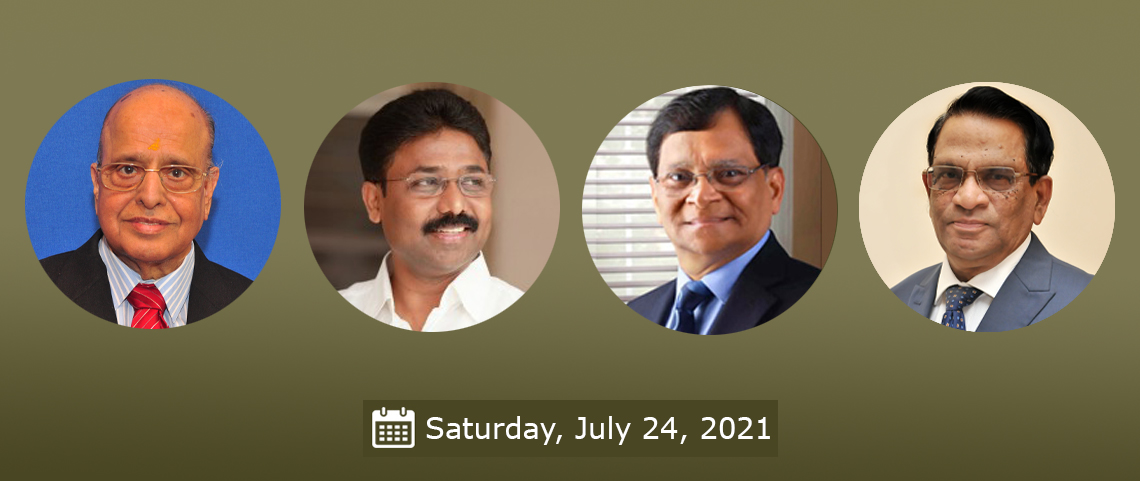 On July 29, 2020, the National Education Policy 2020 (NEP 2020), came into force by the Government of India. SRM University-AP organised a sought after webinar titled “Creating a Vibrant Knowledge Society – An Indian Strategy for 21st Century” on July 24, 2021, as a part of its University Distinguished Lecture Series. Padma Vibhushan Dr K Kasturirangan, Chairman, National Education Policy-2020 (NEP), expounded the salient features and importance of the National Educational Policy. Dr Audimulapu Suresh, Hon’ble Minister for Education, Andhra Pradesh, and Prof Vijayalakshmi Saxena, General President, ISCA, delivered special addresses.
On July 29, 2020, the National Education Policy 2020 (NEP 2020), came into force by the Government of India. SRM University-AP organised a sought after webinar titled “Creating a Vibrant Knowledge Society – An Indian Strategy for 21st Century” on July 24, 2021, as a part of its University Distinguished Lecture Series. Padma Vibhushan Dr K Kasturirangan, Chairman, National Education Policy-2020 (NEP), expounded the salient features and importance of the National Educational Policy. Dr Audimulapu Suresh, Hon’ble Minister for Education, Andhra Pradesh, and Prof Vijayalakshmi Saxena, General President, ISCA, delivered special addresses.
Prof. D. Narayana Rao, Pro-Vice-Chancellor, SRM University – AP in his welcome address said that the NEP – 2020 laid the foundation for a new India of the 21st Century. He said that NEP is poised to yield outstanding results in the fields of Higher Education, Research, Innovation and Science & Technology Development in the country. Prof. Narayana Rao said that NEP 2020 is a game-changer for education in the country. He also opined that no country has achieved self-reliance without education of high quality.
In his Distinguished Lecture, Dr Kasturirangan asserted that over the next decade, India would have the highest population of young people in the world, more than 50% below the age of 35 years aspiring for high-quality education.
“How to learn? Moreover, how to become lifelong learners?-This is a critical question that needs to be addressed appropriately. Furthermore, the education of the future generations needs to be reconfigured to meet the targets of the sustainable development goals set for the year 2030. Especially goals for quality education seek higher inclusion, equitable quality education and promotion of lifelong learning opportunities for sustainable economic growth, full and productive employment and decent work for all,” explained Dr Kasturirangan.
Dr Kasturirangan further delineated, “India now needs an education system aligned with the aspirational goals of the 21st century while remaining rooted to India’s values, systems and ethos. NEP-2020 is crafted to provide an integrative yet flexible approach to education, keeping the interconnections of various phases of education. NEP-2020 is an end-to-end educational roadmap for the country with a broad view of encompassing holistic development, kindling the true potentials of the individuals. The policy is designed in accordance with developmental, cognitive and educational psychology, indicating that 5+3+3+4 design is better suited to a child’s learning trajectory.”
Dr Kasturirangan further explained the role of universities, degree colleges, the importance of open and distance education and the role of teachers. Teachers are the pillars of the successful implementation of NEP-2020. The new policy has facilitated the teachers and revised their roles to achieve the goal.
The major emphasis given in the policy is to the aspect of holistic and multidisciplinary education as the fundamental component of every level of education. Universities are perennial sources to generate and disseminate new ideas and knowledge. These are the effective eco-systems for interactions among diverse disciplines. He further requested SRM University-AP to consider setting up a Centre of Excellence in Education to offer B.Ed and M.Ed courses to prepare teachers.
Dr Kasturirangan said that the teachers trained in universities amongst the passionate and high profile Professors, will be excellent teachers and excel in teaching. Thus, the Universities need to take the initiative of setting up Centres of Excellence in education. At the Post-graduation level, one of the key recommendations of the policy is the strengthening of the research at the university system. The policy recommends the creation of a National Research Foundations for the purpose. National Research Foundation came into being with the vision of increasing the quantum and scope of quality research across all disciplines, creating a much larger workforce in the country. It also aims to promote Indian Art, Culture and Languages.
The policy also highlights the critical need to manage research at all levels- pure, applied, transactional, and research addressed to specific needs of the industry and social objectives. The primary role of the National Research Foundation will be to nurture a vibrant research eco-system through adequate funding, mentoring and support of multidisciplinary research in Arts and Humanities, Social and Natural Sciences, Engineering and Technology, including educational technology. Dr K. Kasturirangan emphatically mentioned that India will be the skill capital of the world. He also mentioned that India must lead in emerging technologies: Artificial Intelligence, Additive Manufacturing, Neurosciences, e-mobility etc.
In his Presidential Address, Dr Adimulapu Suresh expressed his happiness to share the various initiatives that Government of Andhra Pradesh is taking towards implementing National Education Policy-2020. Dr Suresh said that the Government of Andhra Pradesh, under the leadership of Hon’ble Chief Minister Y S Jagan Mohan Reddy, has accepted the concept and recommendations of National Education Policy-2020 that it has envisaged.
Dr Suresh agreed that education should have equality, accessibility, affordability, accountability and reachability among all. In the 21st century, poverty can no longer be a barrier to education. Hence, the Government of Andhra Pradesh has introduced several novel programmes and schemes to bring education to everyone, and NEP-2020’s recommendations have aided to take their schemes forward.
The Government of Andhra Pradesh believes that mothers are the key to an educated family. Therefore, the Government has introduced an incentive programme for mothers. Every mother who sends her child to a school will get 15000 rupees from the Government of Andhra Pradesh. The Government has further introduced Full Fee Reimbursement for the students below poverty level.
Dr Suresh proclaimed, “People who were denied education for centuries now can find their voices. Not a single child will be denied education. Hence, the Government of Andhra Pradesh has allocated 17% of its budget, i.e. nearly thirty thousand crores, for education. We are currently spending 2-3% of GSDP for education which is very close to what has been prescribed in the NEP-2020. Following the recommendation of NEP-2020, The Government of Andhra Pradesh is also introducing Academic Banks of Credits (ABC) and Choice based credit system (CBCS) to provide students with freedom and flexibility in education.”
Dr Suresh further mentioned that NEP-2020 emphasises Higher Education but does not enlighten much on Primary Education. CM Y S Jagan Mohan Reddy has taken revolutionary steps to reconstruct Primary Education, developing the common curriculum and language training. Along with that, The Government is also putting an emphasis on Communicative and Soft Skill Training. Therefore, the Government of Andhra Pradesh can proudly say that that they have been the first state in the nation to imbibe the recommendations of National Education Policy-2020.
Dr Vijayalakshmi Saxena, in the Special Address, further elaborated that the previous policy on education was decades old. With the changing time, the policy also needs to be improvised. NEP-2020 has filled the void and came up with suggestions for the making of the 21st century. She said, “As educators, it is our duty to bring youngsters to take up new challenges. The vision of Indian Education, as mentioned in the policy, is to touch everyone’s life, consistent with their needs and necessities. she concluded.
Prof D Narayana Rao, Pro-Vice-Chancellor presented the book – Space and Beyond: Professional Voyage of K. Kasturirangan, to the Hon’ble Minister, and mementoes to all the speakers.
In his concluding remarks, Prof VS Rao, Vice-Chancellor of SRM University-AP, congratulated Dr Kasturirangan for the brilliantly conceptualized new education policy. He agreed with Dr Kasturirangan to the need of having a dedicated centre for the advancement of education. Prof Rao announced the inception of the Centre of Educational Innovation and Excellence that SRM University-AP has envisaged in the near future.
- Published in News
Talkspiration series explores social entrepreneurship
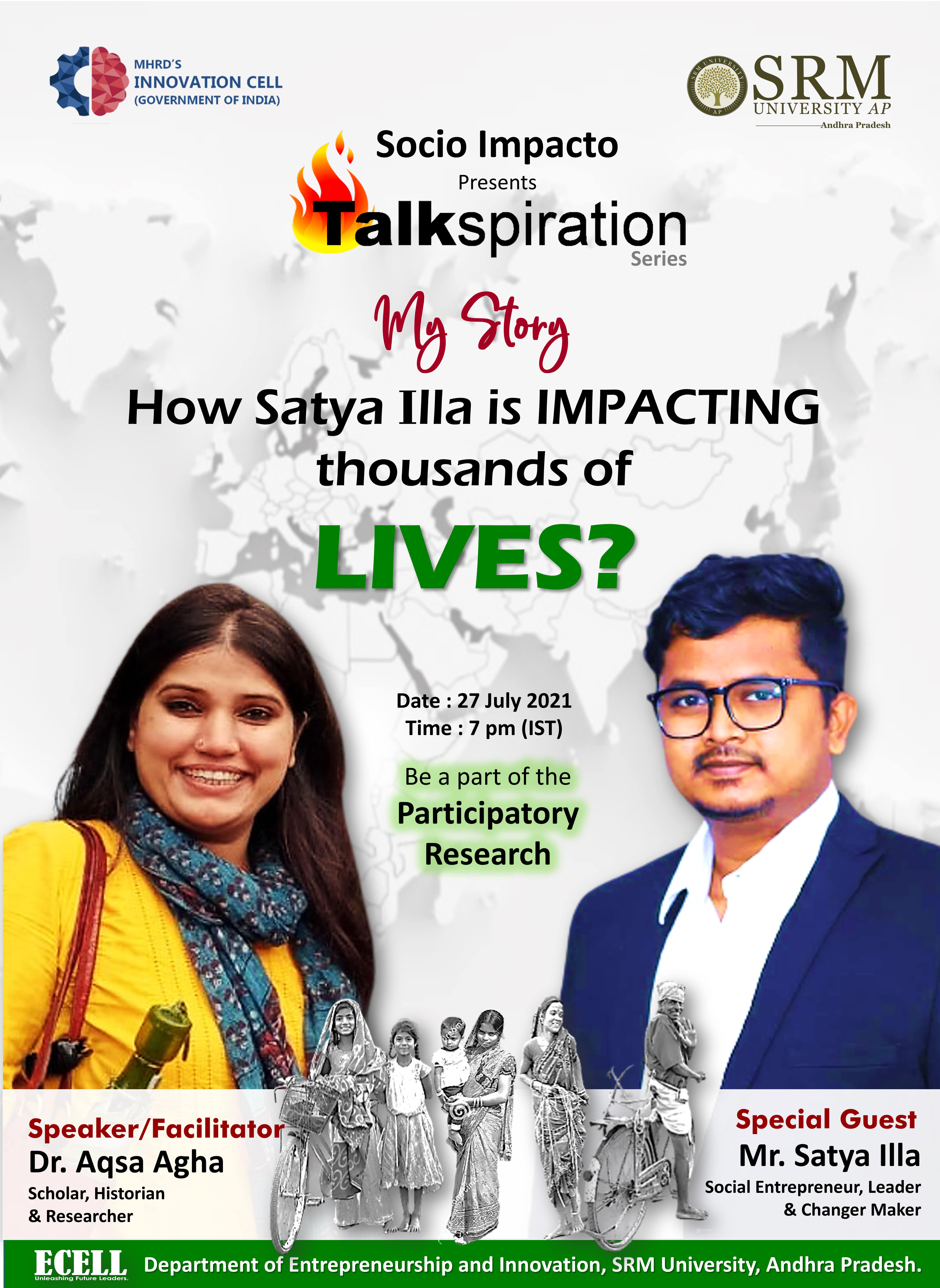 Socio Impacto by E-Cell at SRM University-AP has taken the initiative to organise a Talkspiration Series, where influencers and achievers will share their stories about success. As part of the series, a lecture on the title “How Satya Illa is IMPACTING thousands of LIVES,” is scheduled to be held on July 27, 2021, at 7.00 pm on the Zoom platform. (more…)
Socio Impacto by E-Cell at SRM University-AP has taken the initiative to organise a Talkspiration Series, where influencers and achievers will share their stories about success. As part of the series, a lecture on the title “How Satya Illa is IMPACTING thousands of LIVES,” is scheduled to be held on July 27, 2021, at 7.00 pm on the Zoom platform. (more…)
- Published in Events, IDEA Events, Webinars
SRM University- AP ranked as the second Top Emerging Engineering Institute
SRM University-AP, Andhra Pradesh has been ranked second among Top Emerging Engineering Institute – Telangana & AP in the Times Engineering Institute Ranking Survey 2021. The research aimed to arrive at a list of top engineering colleges offering full-time courses, including four-year courses in Telangana and Andhra Pradesh.
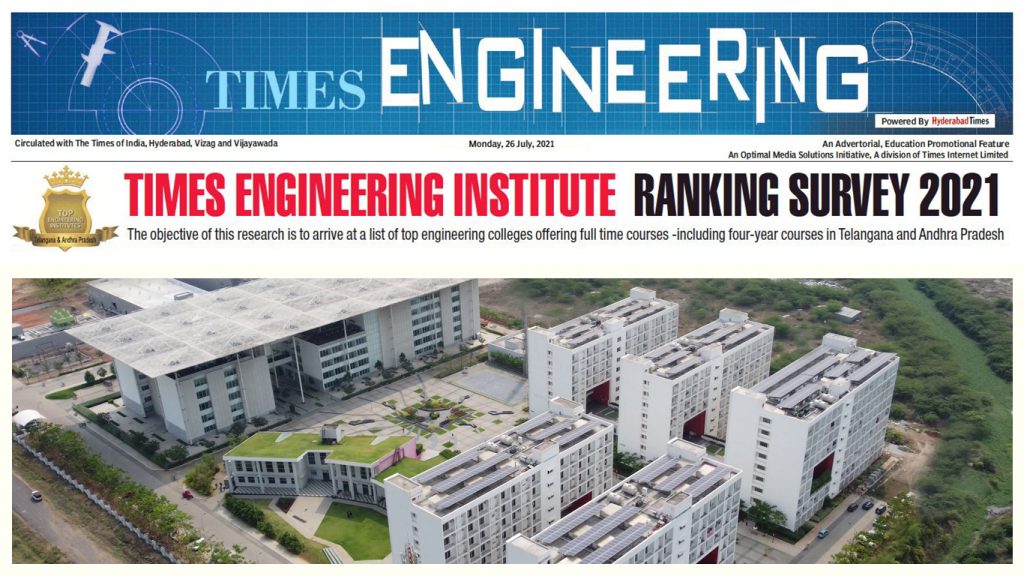 Designed by the renowned American builders Perkins + Will, SRM University-AP is a healthy, sustainable place to live, learn, work, play, and pursue research. The university offers various engineering, sciences, social sciences, entrepreneurial and management courses through its 17 departments spread across three schools. The campus is adorned with state-of-the-art labs equipped with cutting edge technology, 6 wifi enable hostels for 1500 students, a dining area with 1000 seating, an auditorium with 1000 seating capacity, a library with 100000+ books and offline/online subscriptions and many more.
Designed by the renowned American builders Perkins + Will, SRM University-AP is a healthy, sustainable place to live, learn, work, play, and pursue research. The university offers various engineering, sciences, social sciences, entrepreneurial and management courses through its 17 departments spread across three schools. The campus is adorned with state-of-the-art labs equipped with cutting edge technology, 6 wifi enable hostels for 1500 students, a dining area with 1000 seating, an auditorium with 1000 seating capacity, a library with 100000+ books and offline/online subscriptions and many more.
SRM University-AP offers best in class education with the ‘Interdisciplinary Experiential Active Learning’ (IDEAL) curriculum, ‘Undergraduate Research Opportunities Project’ (UROP), Capstone Projects and Industry Internships. In view of the latest trends and industry demands, SRM University-AP’s pedagogical system was initially designed in partnership with MIT and has evolved to meet the changing needs of education.
Our students are offered exposure and global educational and entrepreneurship experience through the Semester abroad programme with UC Berkeley, University of Wisconsin-Madison, Northeastern University, Asia University-Taiwan, EFREI-France, Flinders University-Australia and others. We further offer a Unique Twinning Programme with IIT-Chicago for our engineering students, where they will pursue their initial two years in SRM AP and final two years on the IIT-Chicago campus.
The bright and brilliant maiden batch of SRM University-AP has secured 100% Placement. The very talented twins Rajarshi and Saptarshi Mazumder are offered international placements with PVP Inc, a strategic partner of Google Japan with an attractive package of 50 LPA. 71% of our students were placed with Dream and Super Dream offers. Computer Science and Engineering branch earned an average pay package of 8 LPA and other engineering branches secured an average package of 7 LPA in the Campus Placement Drive 2021. Our top recruiters include Amazon, Paypal, Bank of America, Standard Chartered Bank, Infosys, TCS to name a few.
The Innovation, Design and Entrepreneurship Academy (IDEA) of SRMAP is actively engaged to mould the leaders of tomorrow. The Hatchlab Research Center (TBI of SRM AP) is currently facilitating the incubation of 40+ student startups with 200+ industry mentors. Our student venture OurEye.ai has received a $120,000 angel investment. In addition, 10,000+ sqft, state of the art incubator space along with Seed funding are provided to every eligible student venture.
SRM University-AP puts an emphasis on quality research to serve society. Consequently, the nascent University has published 500+ research papers in high impact Scopus indexed journals, including Nature Communications. The University has filed/published 22 patents and working on 35 research projects with an outlay of 17.49 crores. The students have developed nature-friendly e-bike and face shields with biodegradable elements and received copyright from Indian Patent Office. SRM University-AP further promotes student-run labs such as Next-Tech Lab, Ennovab where students share their ideas to curate those into applications to benefit society.
To know more:
Survey Report
- Published in Awards and Rankings, News
Undergraduates bring off one more patent to SRM University-AP
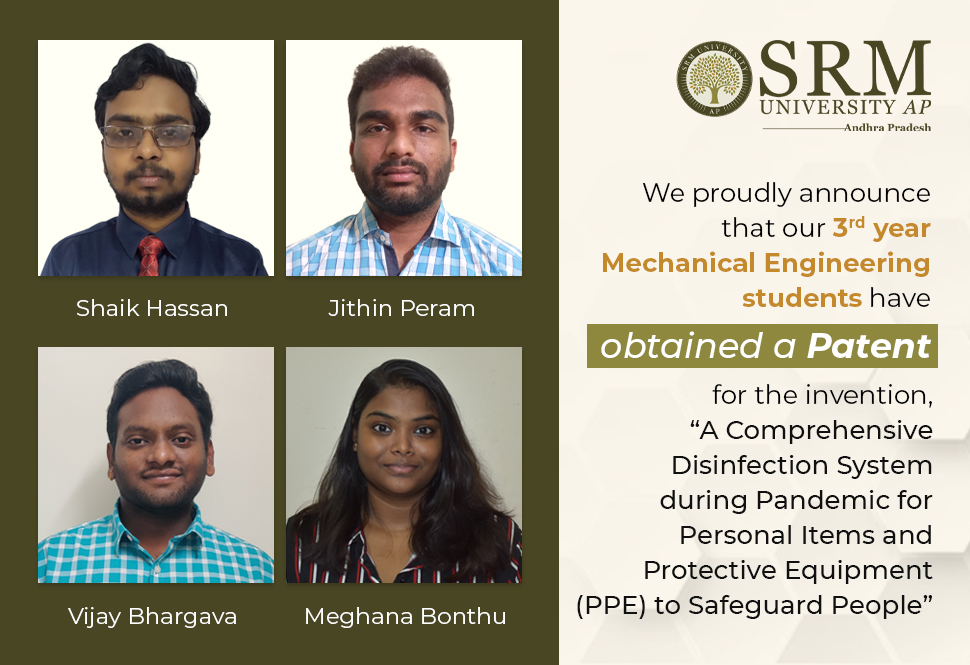 Young researchers from Mechanical Engineering- S.K Hassan, M.Vijaya Bhargava, Jithin Peram, and Meghana Bonthu- have added one more laurel to SRM University-AP by inventing something novel! Under the supervision of faculty from the Department of Mechanical Engineering, the quartet have published a patent A Comprehensive Disinfection System during Pandemic for Personal Items and Protective Equipment(PPE) to Safeguard People.
Young researchers from Mechanical Engineering- S.K Hassan, M.Vijaya Bhargava, Jithin Peram, and Meghana Bonthu- have added one more laurel to SRM University-AP by inventing something novel! Under the supervision of faculty from the Department of Mechanical Engineering, the quartet have published a patent A Comprehensive Disinfection System during Pandemic for Personal Items and Protective Equipment(PPE) to Safeguard People.
The current Covid-19 pandemic has led to an enormous demand for gadgets/objects for personal protection. To prevent the spread of the virus which proliferates also through surface transmission, it is important to disinfect objects of common use. One of the ways suggested is to use a UV-C disinfecting box that is efficient and effective in deactivating the COVID-19 virus. The novelty of the product prototype is the use of a UVC transparent material (fused silica quartz glass tubes). This not only physically supports the objects to be disinfected but also improves the effectiveness of disinfection. The aluminium foil which the students have used, a UV reflecting material, was used as the inner lining of the box for effective utilization of the UVC light emitted by the UVC lamps. Care has been taken to prevent leakage of UVC radiation out of the system. COVID-19 virus can be inactivated in 5 minutes by UVC irradiation in this disinfection box.
This novel product can help in efficiently sanitizing normal household items such as mobile phones, keys, purses, grocery and also PPE kits (masks, gloves, visors etc.). This product is not only affordable but also makes disinfection faster. Moreover, the operational process is simple – open the door, place the objects, turn it on and then retrieve them sanitised within minutes.
“We are looking forward to taking up this UV Box to the next stage of implementation with a more compact and more efficient mechanism”, says the proud team behind the invention. “We are ready to undertake new projects and with the help and support from Dr Venkat Nori and other faculty members”, they added.
Link to patent document: https://ipindia.gov.in/writereaddata/Portal/IPOJournal/1_4971_1/Part-1.pdf
- Published in Departmental News, Mechanical Engineering NEWS, News, Students Achievements


